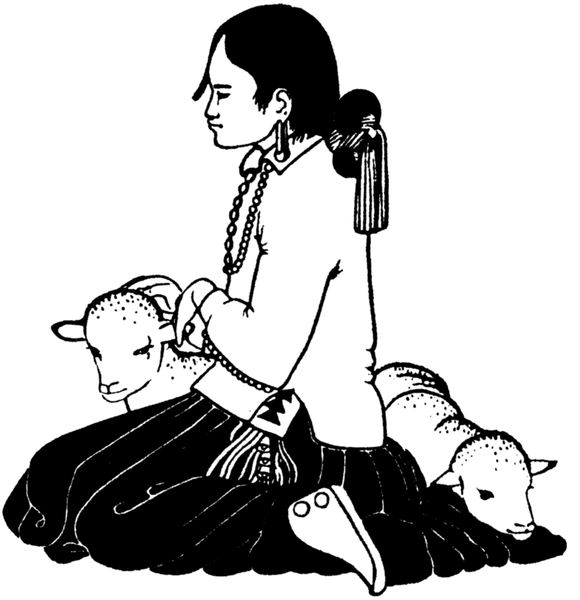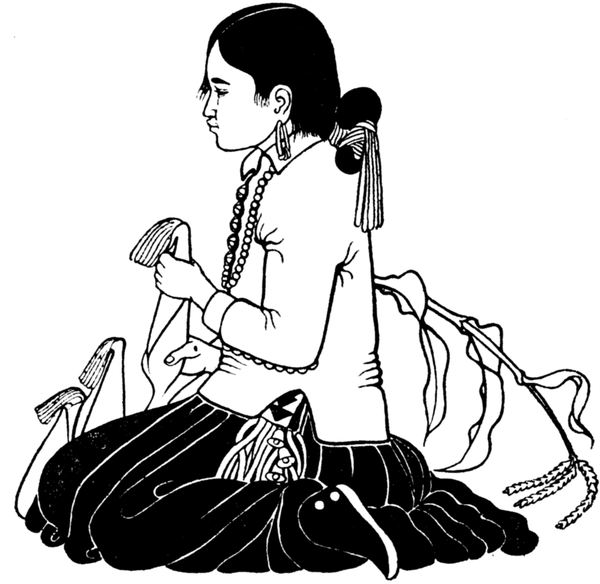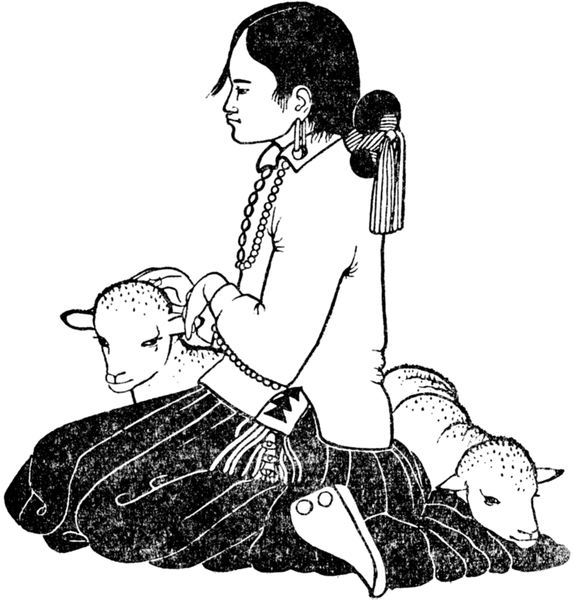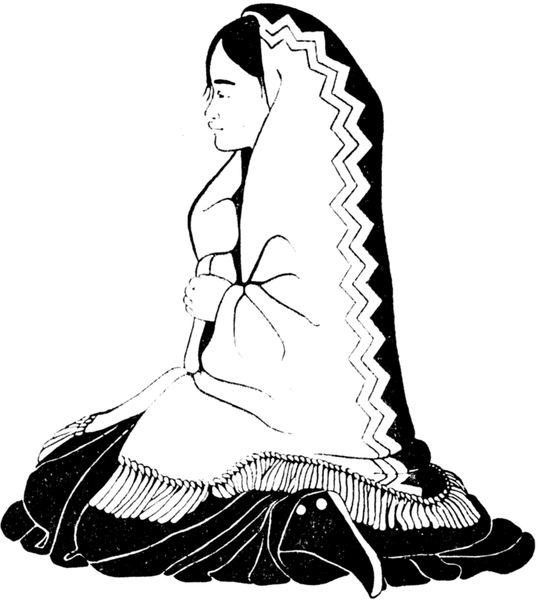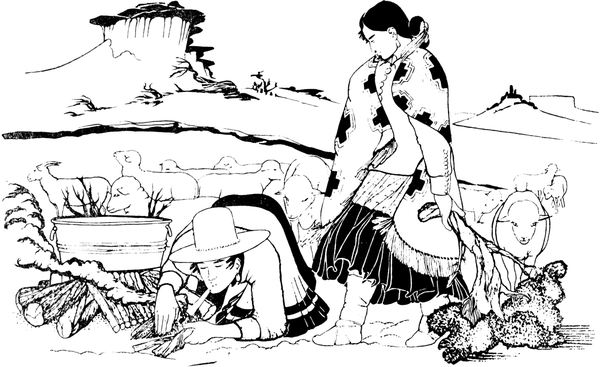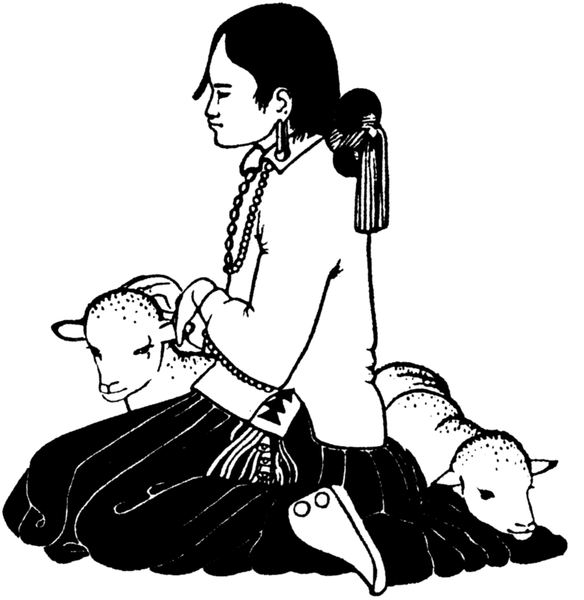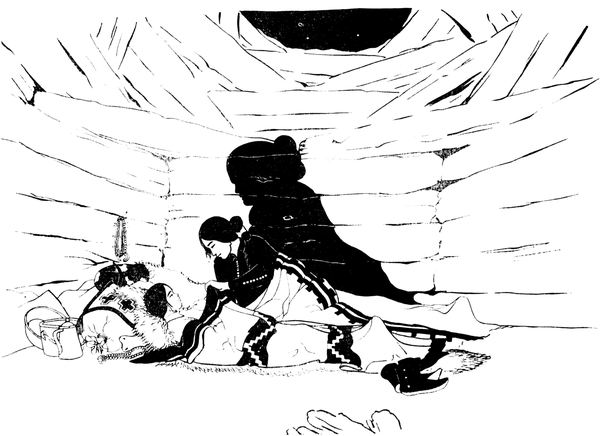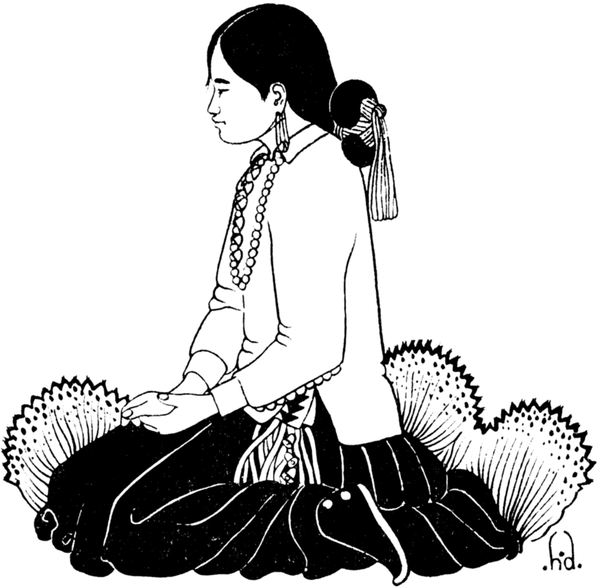The Project Gutenberg EBook of The Little Navajo Herder, by Ann Clark
This eBook is for the use of anyone anywhere in the United States and most
other parts of the world at no cost and with almost no restrictions
whatsoever. You may copy it, give it away or re-use it under the terms of
the Project Gutenberg License included with this eBook or online at
www.gutenberg.org. If you are not located in the United States, you'll have
to check the laws of the country where you are located before using this ebook.
Title: The Little Navajo Herder
Author: Ann Clark
Illustrator: Hoke Denetsosie
Release Date: June 12, 2016 [EBook #52311]
Language: English
Character set encoding: UTF-8
*** START OF THIS PROJECT GUTENBERG EBOOK THE LITTLE NAVAJO HERDER ***
Produced by Richard Tonsing, Juliet Sutherland and the
Online Distributed Proofreading Team at http://www.pgdp.net
Transcriber's Note:
The cover image was created by the transcriber and is placed in the public domain.
DEPARTMENT OF THE INTERIOR
Oscar L. Chapman, Secretary
UNITED STATES INDIAN SERVICE
Dillon S. Myer, Commissioner
EDUCATION DIVISION
Willard W. Beatty, Chief
Authorized by Congress
Printing Department
Haskell Institute
Price
.25
September, 1951—5M
LITTLE NAVAJO
HERDER
Illustrated by HOKE DENETSOSIE
UNITED STATES INDIAN SERVICE
HASKELL INSTITUTE—LAWRENCE, KANSAS
LITTLE NAVAJO HERDER
In Little Navajo Herder, we have brought together
in one volume the pictured story of a year in the
life of a little Navajo girl, which originally appeared in
four separate books. In the first edition, which was
prepared for classroom use in Federal Indian schools,
the stories appeared in both English and Navajo. However,
the popularity of Little Herder was not limited to
the child readers of her own tribe. She has found her
way into the hearts of Indian children throughout the
nation. The universality of her appeal is indicated by
increasing interest in her story by non-Indian children in
home and school. Selections from her books have found
their way into dozens of anthologies. This popularity
with those who read only English has dictated this single
volume edition in English. Again the delightful drawings
by Hoke Denetsosie, a full-blood Navajo artist, are used.
Little Navajo Herder bids fair to find a permanent
place in children's literature, as has Mrs. Clark's earlier
volume on Pueblo life—"In My Mother's House." This
book is illustrated by a Pueblo artist, Velerio Herrera, and
is published by Viking Press.
Other Indian stories by Mrs. Clark have been published
by the Indian Service for use in Indian schools. A
complete list may be obtained from Haskell Institute,
Lawrence, Kansas.
1
IN AUTUMN
2
|
Page |
| |
| Home Land |
3 |
| |
| The Hogan |
4 |
| |
| Night Corral |
5 |
| |
| The Cornfield |
6 |
| |
| My Mother |
7 |
| |
| My Father |
8 |
| |
| Possessions |
9 |
| |
| The Horses |
10 |
| |
| The Sheep |
11 |
| |
| The Goats |
12 |
| |
| The Lambs |
13 |
| |
| The Trading Post |
14 |
| |
| Selling |
15 |
| |
| The Silversmith |
17 |
| |
| Turquoise |
18 |
| |
| It Is Dry |
19 |
| |
| Sorting the Wool |
20 |
| |
| Cleaning the Wool |
21 |
| |
| Carding the Wool |
22 |
| |
| Spinning |
23 |
| |
| Autumn |
25 |
| |
| Dyeing |
27 |
| |
| Weaving |
29 |
| |
| Learning To Weave |
30 |
| |
| Flood |
32 |
| |
| Sun |
33 |
| |
| Herding |
34 |
3
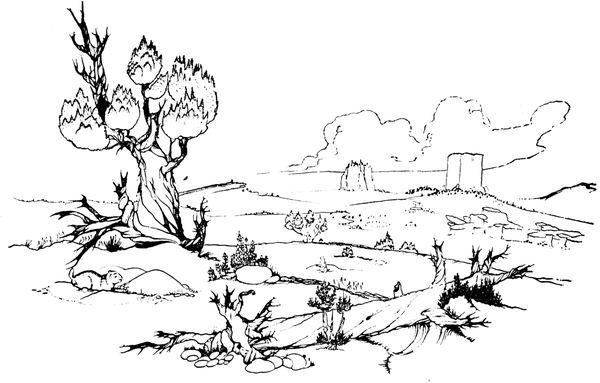
HOME LAND
The land around my mother's hogan
is big.
It is still.
It has walls of red rocks.
And way, far off
the sky comes down
to touch the sands.
Blue sky is above me.
Yellow sand is beneath me.
The sheep are around me.
My mother's hogan is near.
4
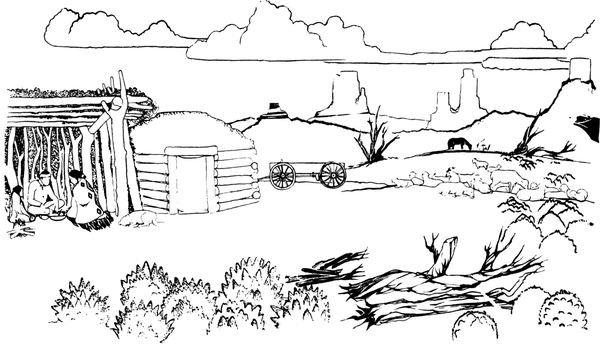
THE HOGAN
My mother's hogan is round
and earth-color.
Its floor is smooth and hard.
It has a friendly fire
and an open door.
It is my home.
I live happily
in my mother's hogan.
5
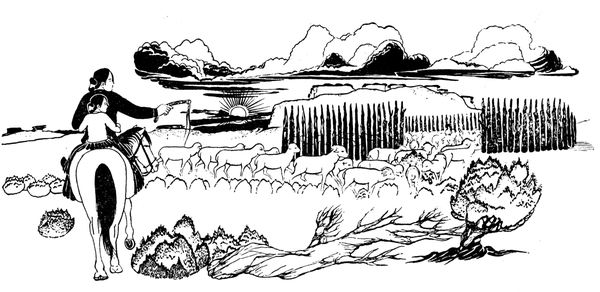
NIGHT CORRAL
The night corral is fenced
with poles.
It is the home for the sheep
and the goats
when darkness comes
to my mother's land.
6
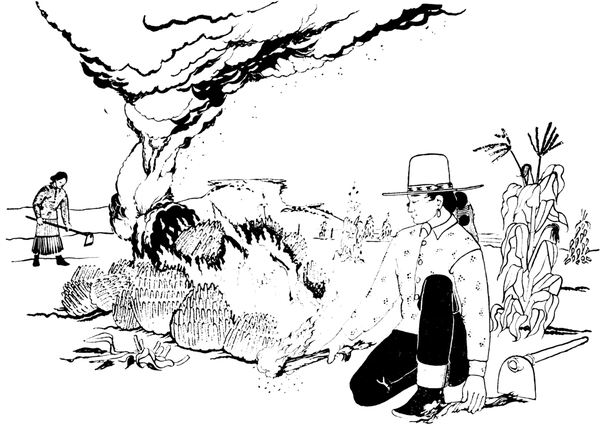
THE CORNFIELD
The cornfield is fenced with poles.
My mother works in the cornfield.
My father works in the cornfield.
While they are working
I walk among the corn plants.
I sing to the tall tasseled corn.
In the middle
of all these known things
stands my mother's hogan
with its open door.
7
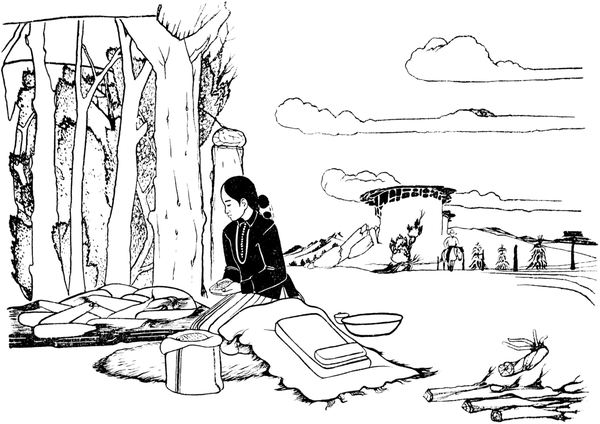
MY MOTHER
My mother is sun browned color.
Her eyes are dark.
Her hair shines black.
My mother is good to look at,
but I like her hands the best.
They are beautiful.
They are strong and quick
at working,
but when they touch my hands
they are slow moving
and gentle.
8
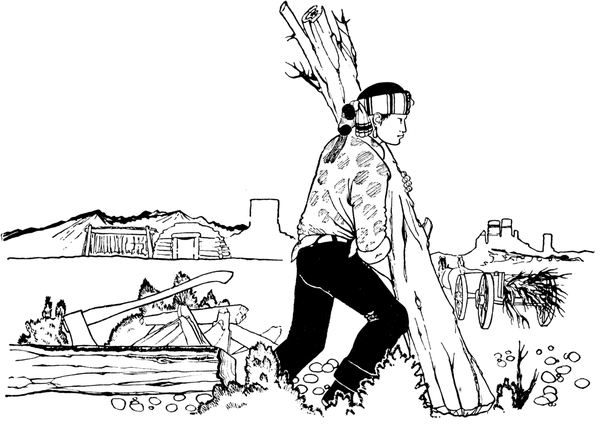
MY FATHER
My father is tall.
He is strong.
He is brave.
He hunts and he rides
and he sings.
He coaxes the corn
and the squash plants
to grow
out of the sand-dry earth.
My father has magic
in his finger tips.
He can turn
flat pieces of silver
into things of beauty.
Sometimes
I hide in the wide folds
of my mother's skirts
and look out at my father.
9
POSSESSIONS
I have black hair.
I have white teeth.
My hands are brown
with many fingers.
My feet are brown
with many toes.
My arms are brown
and strong.
My legs are brown
and swift.
I have two eyes.
They show me how things look.
I have two ears.
They bring sounds
to stay with me
for a little while.
I have two names,
a War Name
for just me to know
but not to use,
and a nickname
for everyone to use
for every day.
But with all these things
I still am only
one little girl.
Isn't it strange?
10
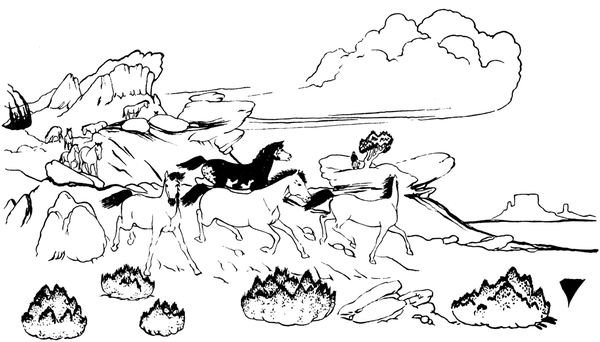
THE HORSES
I see my father's horses
running in the wind.
I feel little
standing here
when the wind
and the horses
run by.
11
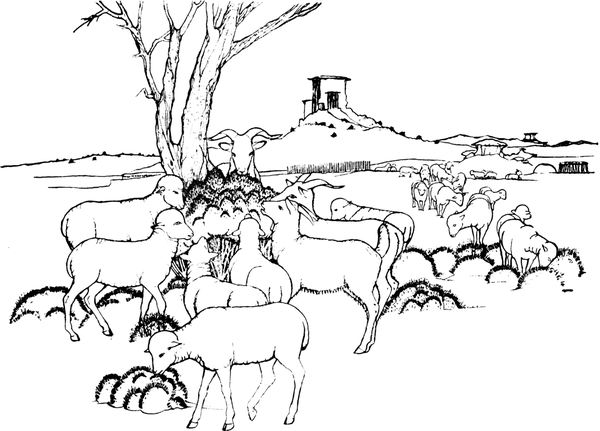
THE SHEEP
Of all the kinds of sheep,
Navaho sheep
give the best wool
for weaving.
My mother says
that is why
they are Navaho sheep,
because they know best
the needs of The People.
12
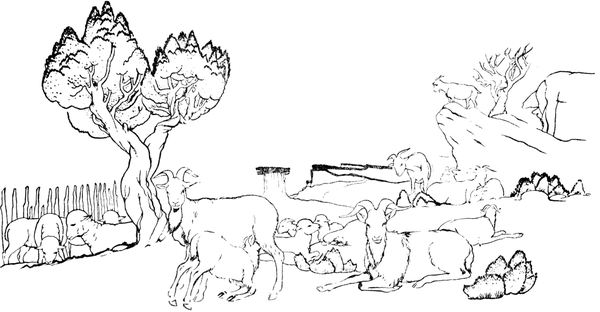
THE GOATS
Goats have long whiskers.
They have long faces.
They have long legs.
Goats are funny, I think.
13
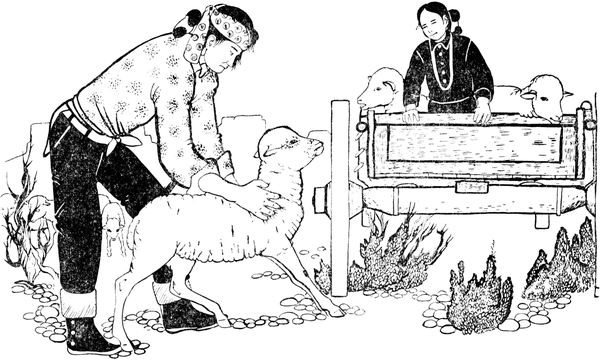
THE LAMBS
Now that it is autumn,
the lambs
that were babies in the spring,
have grown.
They are almost as tall
as their mothers.
My father takes the lambs
in his wagon
to the trading post.
He takes them to sell
to the trader.
14
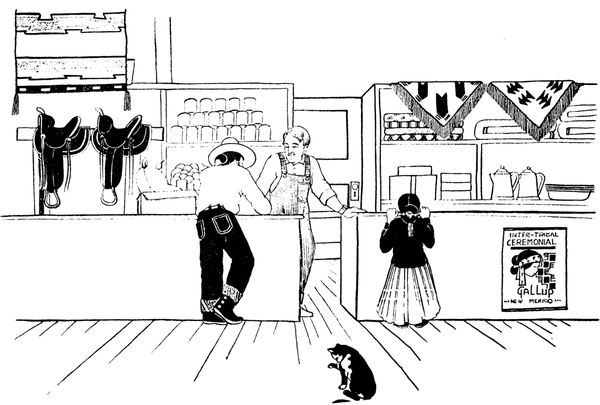
THE TRADING POST
Hosteen White Man
has the trading post.
He has hard things on the shelf.
He has soft things on the wall.
And in a jar
he has red stick candy
that he keeps just for me.
Hosteen White Man
at the trading post
is such a good man.
Sometimes, I forget he is not
one of The People.
15
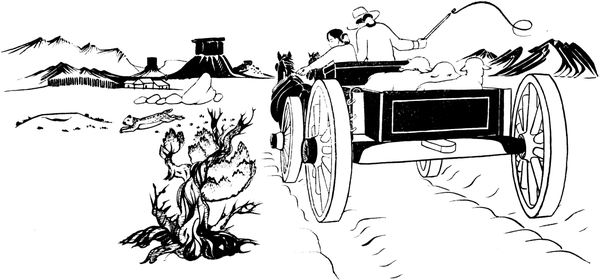
SELLING
In his wagon
my father drives
to the trading post.
He takes the lambs
and he takes me, too.
He wants me to know
about selling.
He tells me that sometimes
he trades the lambs,
and sometimes
he gives them in payment
for a debt.
16This time
he will sell them
to the trader.
When we get to the trading post
the trader looks at the lambs.
Then he tells my father
how much he will pay.
I wonder if the lambs
like to have my father
sell them to the trader.
My father sells the lambs
for hard round money
to Hosteen White Man
at the trading post.
Then he chooses cans of food
to put into his wagon,
and he gives Hosteen White Man
some of the round hard money
back again.
My father calls this selling,
but I think
it is a game
they play together,
Hosteen White Man and
my father at the trading post.
My father likes this game of selling.
He did not tell me, but, someway,
I know that he likes it.
17
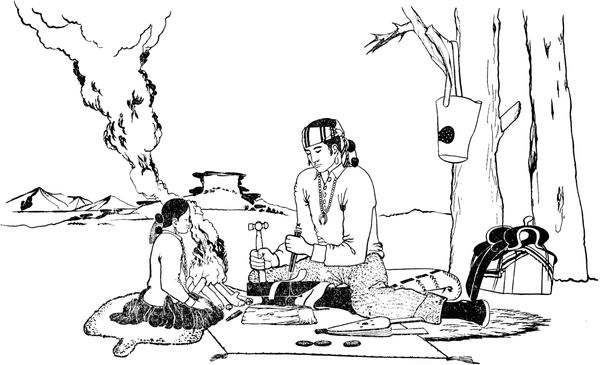
THE SILVERSMITH
My father sits before his forge
melting bars of silver
and turning them
into silver raindrops
and silver cloud designs.
Somehow,
my father has caught the wind
within his bellows
and when he lets it go
its breath
turns the silver
to red earth color.
Its breath cools the silver
until it is hard
like something made
of gray water
and then turned to stone.
Today my father sang
as he worked
at making a bracelet
for my arm.
His song
flowed into the silver circle
making it a circle of song.
18
TURQUOISE
Turquoise is sky.
Turquoise is still water.
Turquoise is color-blue
and color-green
that someone
somewhere
has caught
and turned to stone.
Sometimes, turquoise
is trapped in silver,
and sometimes, in small beads
running along a white string
like beauty following
a straight trail.
19
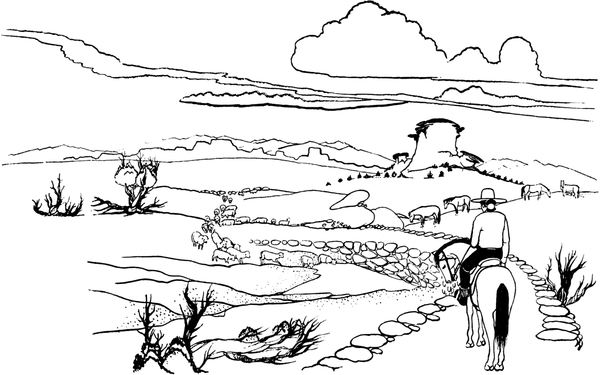
IT IS DRY
My father says
over and over,
"It is dry.
It is too dry."
My father means
there has been no rain
to fill the rain pools
for the thirsty sheep.
20
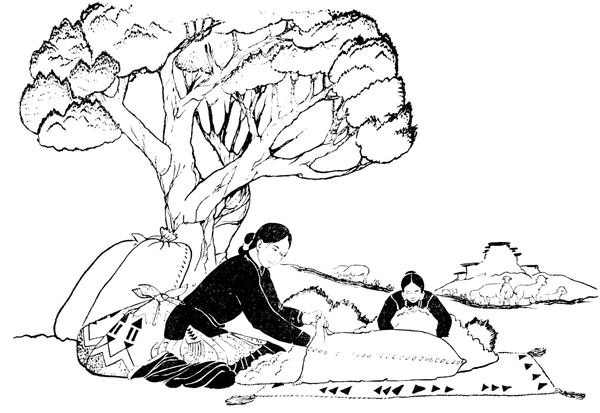
SORTING THE WOOL
I am helping my mother
sort the wool.
This pile we will keep
to spin into yarn for weaving
because its strands
are long and unbroken.
This pile we will sell
to the trader.
Its strands are broken and short.
The trader will buy it,
but he will not pay as much
as if it were all long.
I wish that all our wool
was of long, unbroken strands.
I like to sort the wool.
It is good to feel its softness,
like making words for something
my heart has always known.
21
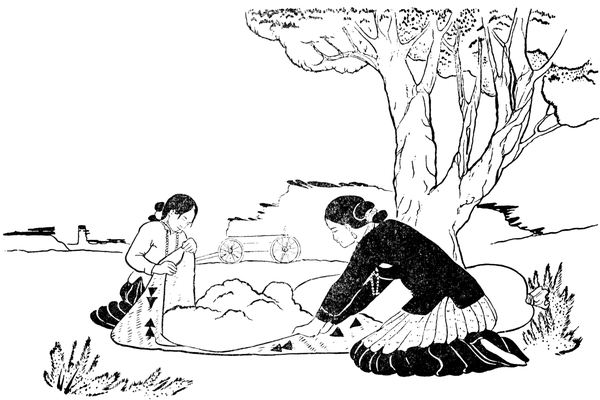
CLEANING THE WOOL
I go with my mother
to beat the wool.
We get the little sticks
and burrs out of it.
We put the wool
on a flat rock.
We beat the wool
with yucca sticks.
I have a little yucca stick
like my mother's big one.
It takes my mother and me
a long time to clean the wool.
22
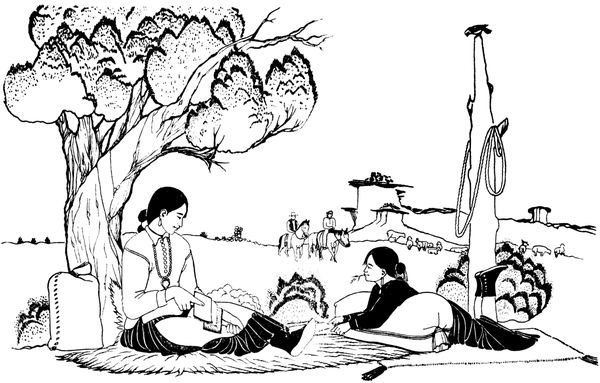
CARDING THE WOOL
I sit with my mother
under the juniper tree.
I watch her card wool
with her towcards.
My mother's towcards
are flat pieces of wood
with strong handles
and with wire teeth.
My mother buys her towcards
from the trader
at the trading post.
With her towcards
she pulls the wool thin.
She stretches it in white sheets
like snow mist in winter.
She bunches it in soft rolls
like white clouds in summer.
Under my mother's towcards
the gray wool turns white.
The matted wool turns fluffy
and soft,
and light as baby eagle down.
I like to sit with my mother
under the juniper tree.
I like to watch her card the wool
with her towcards.
23
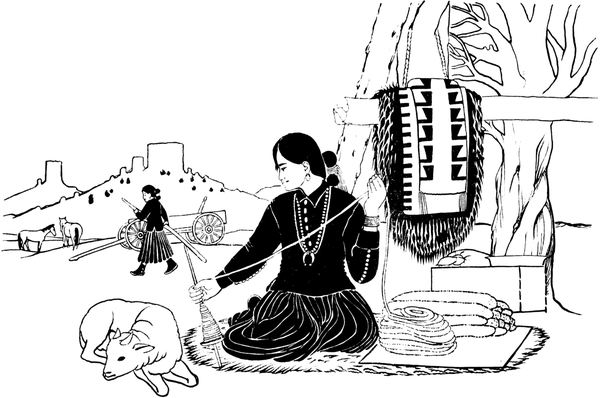
SPINNING
My mother's spindle
is a slender stick
on a hardwood whorl.
Under her fingers
it spins like a dancer,
winding itself
in twisted yarn.
Under her fingers
it twists the wool
into straight beauty
like a trail of pollen,
like a trail of song.
24My hands are not strong enough
to card, very well.
My fingers are not swift enough
to spin, very well.
But my heart knows perfectly
how it is done.
25
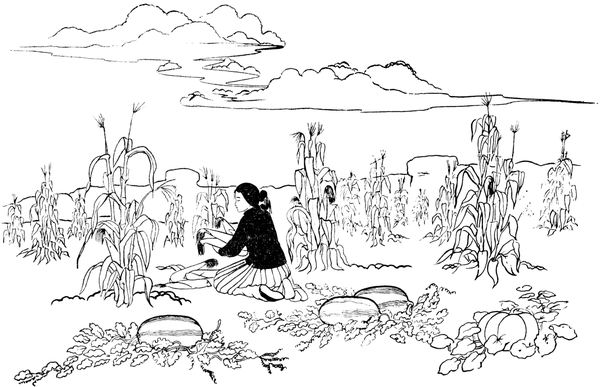
AUTUMN
Now that autumn is here,
the flowers and the plants
give themselves to us
for winter will not need them.
The pumpkins are rusty color
with brown and green patches.
They are ripe.
Ripe is such a good word.
I like to say it.
All the plants are ripe
and beautiful with color
now that autumn is here.
26Soon my mother will go
to the mountains
to gather plants for dyes,
and plants for food,
and plants for medicine.
If I were bigger
she would take me with her.
She does take me
when we go
to places near the hogan.
After heavy frost
my father will go
to the mountains
to gather the pinyons.
This year he will go without us.
He will go with some other men
in a truck
that belongs to the trader.
My mother does not like this.
She thinks
my father should take us
with him
when he goes for pinyons.
27
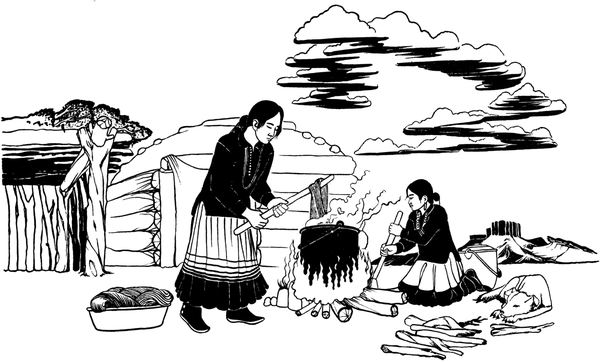
DYEING
With flower plants
and bark and roots
and minerals and water
and fire,
my mother changes
the colors of her yarns.
My mother puts the dye plants
into the dye kettle
over the fire.
Slowly the water
in the kettle
changes its color.
My mother puts white yarn
into this dye water.
She boils it over the fire.
She stirs it with a stick.
It bubbles and bubbles.
It gives a good smell
like plants after rain.
For a little time
my mother boils the yarn
in the dye water,
and then she takes it out again.
It is no longer white.
It has changed color.
28In this way
my mother changes the colors
of her yarns
to look like
brown earth in morning
or yellow sand at mid-day.
She changes the colors
of her yarns
to look like
black cliffs at sunset,
or black like the night,
and black like the dark clouds
of male rain.
I help to gather the flowers
and the bark and the roots
and the minerals.
I help to carry the water
from the rain pool
by the red rocks.
I help to make the fire
with little twigs.
I see the water and the plants.
I see the yarn in the water
but I do not see
the magic
that I think
my mother must use
to change her yarns
to colors.
When I tell this
to my mother,
she laughs at me.
She says she has no magic
in her dye kettle.
She says the plants
in her dye kettle
are the things
which give colors
to her yarns.
So now,
I have learned a new thing.
29
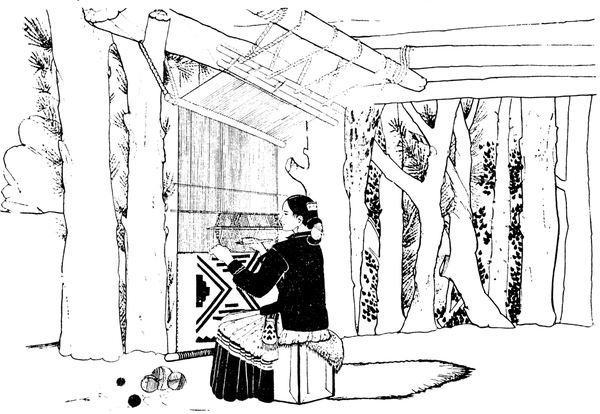
WEAVING
When my mother sits
on her sheepskin,
weaving a blanket on her loom
I think it is like a song.
The warp threads
are the drum beats,
strong sounds
underneath.
The colored yarns
are the singing words
weaving through
the drum beats.
When the blanket is finished
it is like a finished song.
The warp
and the drum beats,
the colored wools
and the singing words
are forgotten.
Only
the pattern
of color
and of sound
is left.
30
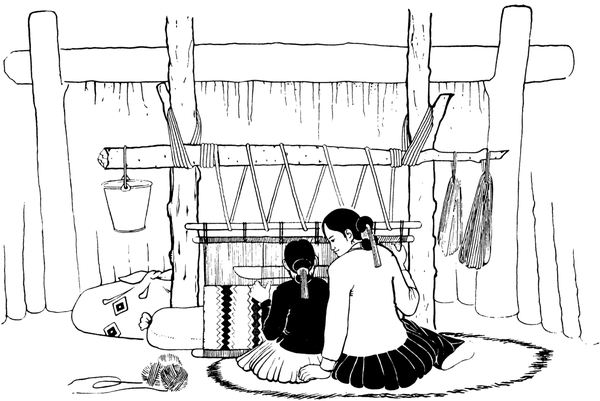
LEARNING TO WEAVE
My mother took me in her arms.
We sat together at her loom.
She took my hands
to guide them
along the weaving way.
She showed them how to weave.
We did not weave
straight across the loom.
That is not our way.
31We wove with one color
for a little way up.
And then with another color
for a little way up.
We kept the edges straight.
We wove not too tight
and not too loose
and pounded it down,
pounded it down,
pounded it.
But when I told my father,
"See, I wove this blanket,"
my mother spoke sharply.
"We do not say
things that are not true,"
she told me.
I hid my face away
from the sharp words of
my mother,
but soon my mother's hand
came gently
to touch my hair.
32
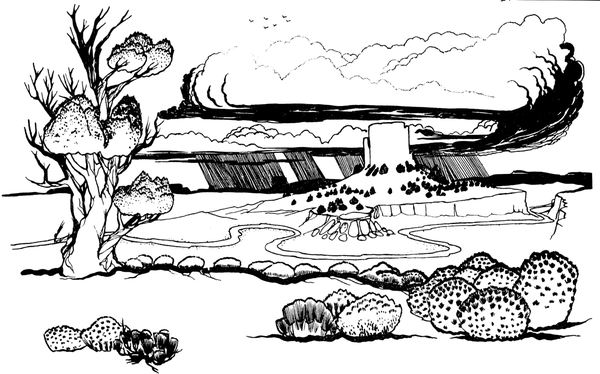
FLOOD
Rain comes hard and black.
It fills the arroyos
with yellow water
running in anger.
Great pieces of sand bank
on the sides of the arroyos
slide into the water
with little tired noises
and are lost for always.
The rain pools fill with water,
rain water,
fresh and clean and cold.
33
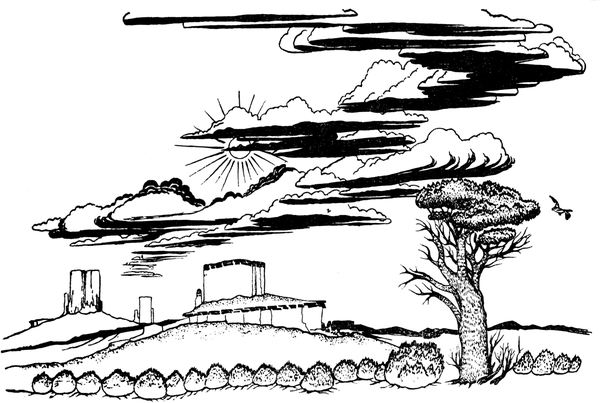
SUN
Sun comes now
to comfort the land
that the rain has frightened.
My father says,
"Sun takes the rain water
from the thirsty land
back to the sky too soon."
But my mother and I,
we are glad the sun comes soon.
Sun does not mean
to rob the land of water.
Sun means only to warm it again.
34
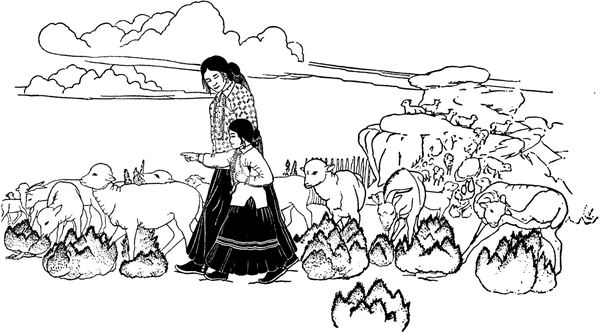
HERDING
Today I go with my mother.
I go with her to drive the sheep
for I must learn to tend
the flock.
It takes many steps
to keep up with my mother.
It takes many steps
to keep up with the sheep.
She calls me
Little Herder of the Sheep.
35And so we walk
across the sand.
We walk
till the day is done,
till the sun goes
and the stars
are almost ready
to come.
We walk to the water hole
when day is at the middle.
We walk to the night corral
when day is at the close,
the sheep,
my mother
and my mother's Little Herder.
Before the hogan fire,
when night has come,
my father sings,
my mother whispers,
"Come sit beside me
Little Herder."
From now till always
I want to be
my mother's Little Herder.
37
IN WINTER
38
|
Page |
| |
| Snow |
39 |
| |
| There Is No Food |
41 |
| |
| The Dogs Are Hungry |
43 |
| |
| Melting Snow Water |
44 |
| |
| Night |
47 |
| |
| Story Telling |
48 |
| |
| It-Is-Twisted |
50 |
| |
| Pawn |
51 |
| |
| Morning |
53 |
| |
| Shoveling the Snow |
54 |
| |
| Cat's Cradles |
55 |
| |
| Father Comes Back |
56 |
| |
| Supper |
58 |
| |
| Sleep |
59 |
| |
| Morning Sun |
60 |
| |
| Going to the Sing |
61 |
| |
| The Sing |
63 |
| |
| The Betting |
66 |
| |
| The Race |
68 |
| |
| Going Home |
70 |
39
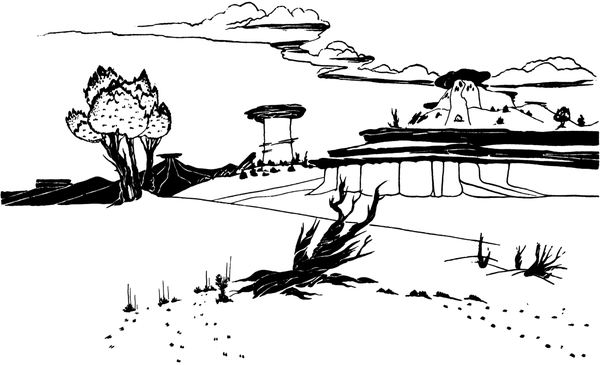
SNOW
My mother's land is white with snow.
The sandwash and the waterhole,
the dry grass patches and the
cornfield hide away
under the white blanket,
under the snow blanket
that covers the land.
The air is filled
with falling snow,
thick snow,
soft snow
falling,
falling.
40Beautiful Mountain
and the red rock canyons
hide their faces
in snow clouds.
It piles the snow
in drift banks
against the poles
of the sheep corral.
It pushes against the door
of my mother's hogan,
and it cries.
The wind cries out there
in the snow and the cold.
My mother's hogan is cold.
Snow blows down the smoke hole.
Water drops on the fire.
The wet wood smokes
and keeps its flames to itself.
The sun
has not shown his face
to tell us
what time of day it is.
I do not like to ask my mother,
"Is it noon now?" or
"Is it almost night?"
because
she might think
I wanted it to be time to eat.
She might think
I wanted food.
41
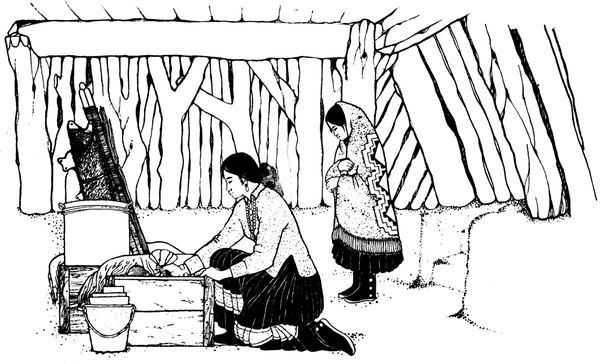
THERE IS NO FOOD
There is no flour nor cornmeal
to make into bread.
There is no coffee
that my mother could boil
for us to drink.
The corn my father planted
in his field
is gone.
42There was so little.
The corn pile in the storehouse
was not high enough
to last for long.
It is gone.
Now all of it is gone.
There is no food.
There is food
at the Trading Post
in sacks and in boxes,
in bins and in cans
on the shelf.
There is food at the Trading Post,
but the Trading Post
is far away
and snowdrifts
and snow clouds
are heavy between.
There is food at the Trading Post
but my father has nothing left
of the hard, round money
that he must give
to the Trader
for the food.
There is no food here
in my mother's hogan.
When it is time to eat,
we talk of other things,
but not of hunger.
This thing called hunger
is a pain
that sits inside me.
At first it was little,
but now
it grows bigger
and bigger.
It hurts me
to be hungry.
43
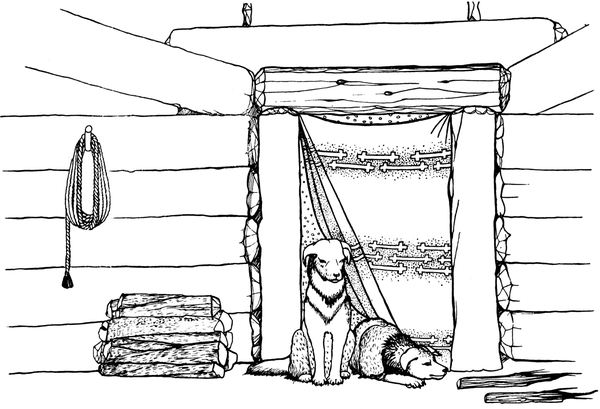
THE DOGS ARE HUNGRY
The dogs are hungry, too.
The black one
is not sleeping now.
He lies with his head
on his paws
and looks at nothing.
He has worked hard,
but there is no food.
The gray shadow dog stays outside
close to the tree trunk
making no sound
asking for nothing.
I think she knows
nobody wants her.
44
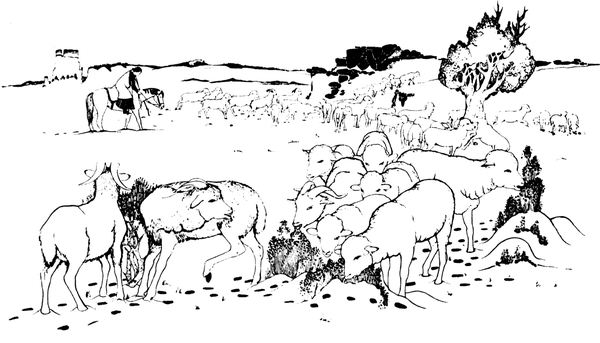
MELTING SNOW WATER
The sheep are wet and cold.
If the snow keeps falling,
it will be bad for the sheep.
Perhaps
that is why the wind cries.
Perhaps
the wind is sorry
for the sheep.
My mother talks to my father.
Together
they go out to shovel snow.
The ruffles on my mother's skirts
make pretty marks on the top
of the snow whiteness.
My mother and my father
shovel a round place
clean of snow
out near the sheep corral.
45They will build a fire
to melt snow into water
to give to the sheep.
It takes much wood
to make a fire
to melt snow into water,
but if the sheep have water
to drink
they do not hunger so much.
When the round place
is clear of snow,
my mother comes into the hogan
for dry wood
to make the outdoor fire.
She picks a stick
from our small pile
beside the fire.
She picks another
until she has a little armful.
My mother picks them up slowly
for our pile is so small.
My father comes into the hogan.
Little hills of dirty snow
melt slowly by them
on the hogan floor.
46It takes a lot of snow
in my mother's washtub
to melt enough water
for the sheep.
When my mother comes again
into the hogan
she is tired.
Her poor face
is dark with cold.
I put my arms
around my mother's knees.
It is the only way I know
to show her
that I am sorry she is cold.
47
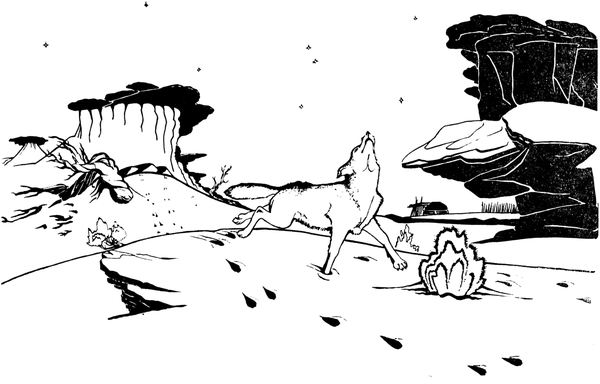
NIGHT
Night is slow in coming,
but at last it comes
moving through the snowstorm.
Snow water drips down
through the smoke hole.
48
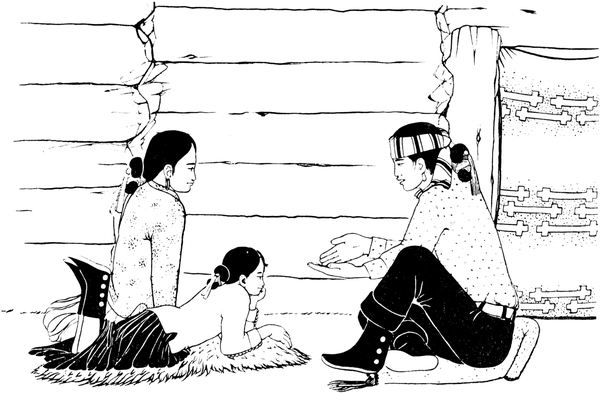
STORY TELLING
Then
my father tells us stories.
Long stories
made up of many words.
My father's words,
they comfort me.
My father tells
The Star Story.
"When the world was being made,
being made."
My father tells us,
"When the Gods were
placing stars,
the stars,
the stars in patterns
in the sky,
coyote stole the star bag."
49Coyote spilled the stars out
in the sky,
helter skelter in the sky,
when the world was being made.
Softly
my father tells it,
the story of the stars.
Outside,
the wind
and the night
push against
my mother's hogan door.
Outside,
big flakes of snow
fall thickly,
fall softly,
fall steadily.
Inside,
snow water drips
down the smoke hole
and the words of
my father's voice
drop softly
into the quiet
of my mother's hogan.
50
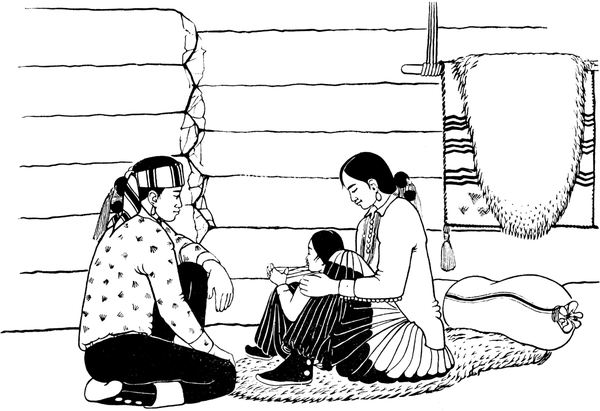
"IT-IS-TWISTED"
The Star Story
made my mother think
of the string game,
"It-Is-Twisted."
She said that the Spider People
gave it to us
to use in winter evenings.
My mother showed us
how to make the game.
She made
Twin-Stars and Many-Stars,
Big-Star and Horned-Star
with pieces of string.
51
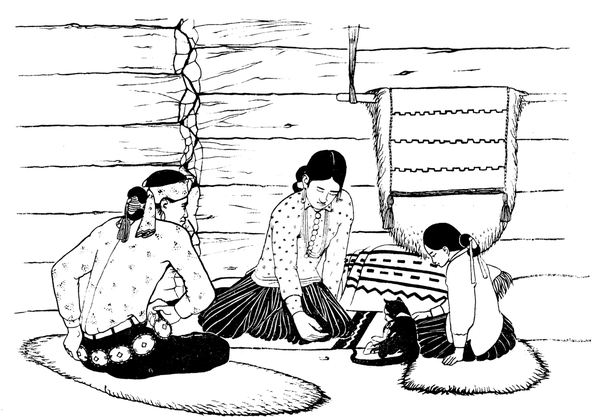
PAWN
Just now,
I heard myself saying,
"I want some bread."
My father is not talking now.
My mother is looking at me.
They do not know it was not I,
but this hunger pain inside me
that said those words,
"I want some bread."
They do not know that,
and I do not know
how to tell them.
My mother looks down
at her hands
where they are resting
in the folds of her skirt.
Outside,
the wind cries
the wind cries
to my thinking.
52Slowly
my father takes his concho belt
from about his waist.
Slowly
his fingers touch the belt,
counting,
counting,
counting the conchos.
Slowly
my mother takes her coral string
from about her neck.
Slowly
she puts it back again
around her neck.
Then
my mother
takes from her finger
her largest turquoise ring.
My father puts his concho belt
upon the floor.
My mother puts her turquoise ring
upon the floor.
The concho belt
and the turquoise ring
make a splash of color
in the gray-lighted hogan.
He will pawn them
because our food
is getting low.
The concho belt
and the turquoise ring
are for pawn.
Pawn to the Trader
for food.
Pawn to the Trader
that we may eat.
Our hard goods,
our possessions
we give them
for salt
and for flour.
Who knows
when we can buy them back.
The snow water drops
from the smoke hole
like tears.
Quickly
my father sings
a funny song
to make laughter come
to my mother and me.
53
MORNING
It has not gone away
I know,
for I can feel it
lying there outside
hiding in the snow.
The wind lies still
behind the snowdrifts,
but sometimes
it starts up
with a low cry,
then falls again to hide.
Cold bends over the land.
The white feathers of snow
fall slower and slower.
My mother and my father
get up early.
My mother will kill a sheep
so my father can eat
something
before he starts
for the Trading Post.
My father waits
for my mother
to butcher the sheep
and to cook a piece
for his breakfast.
Then my father finds his horse.
He ties an empty flour sack
behind his saddle.
He wraps his blanket about him
and leaning his body
against the storm
he rides to the Trading Post.
My father rides
into the snow-filled world.
His blanket and his horse
are the only colors
moving
through the white.
Snow comes into my heart
filling it with cold
when I see
my father ride away.
54
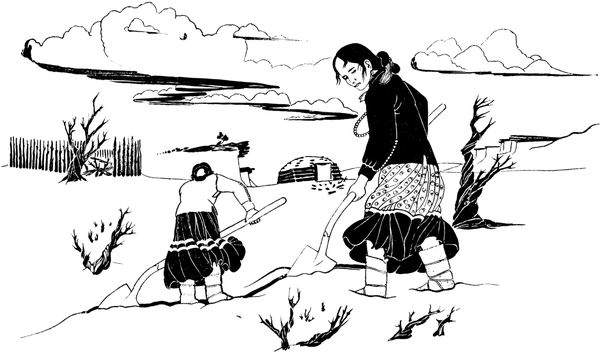
SHOVELING SNOW
For a little while
I sit in the hogan
thinking of my father
riding along the snowy trail
to the Trading Post.
Snow stops falling.
Cold blows its blue breath
across the white.
I help my mother shovel snow.
We make a path to the sheep corral
and to my grandmother's hogan.
The snow, so soft to feel,
is hard to shovel.
The cold slaps at my face.
It traps my hands and my feet
in icy feeling.
My mother takes me
into the hogan.
She rubs my face and hands
and my feet with snow.
Soon
little hot pains
come to play
with my cold fingers
and my cold toes.
Soon the icy feeling goes away.
55
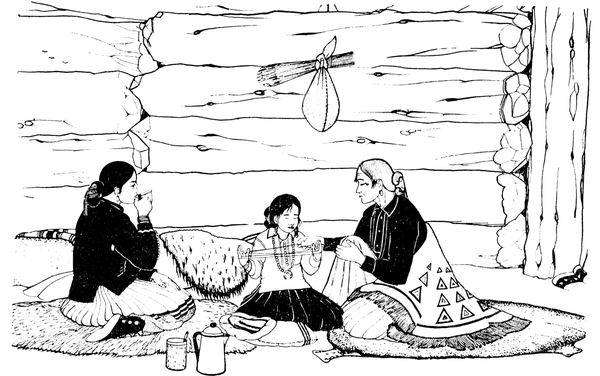
CAT'S CRADLES
My father does not come back
along the trail.
It is far to the Trading Post.
I think of my father
and his concho belt.
I look at my mother's finger.
One finger looks bare
without its turquoise ring.
I pull my sleeve down
over my bracelet.
Perhaps
I should have given it
to my father.
My grandmother comes to see us.
She brings a piece of bread
for me
and for my mother
to eat with our meat.
She brings a piece of string.
She shows me how
to make Cat's Cradles.
She shows me how
to make "It-Is-Twisted."
We make Bird's-Nest and Butterflies
and Coyotes-Running-Apart
with the piece of string.
56
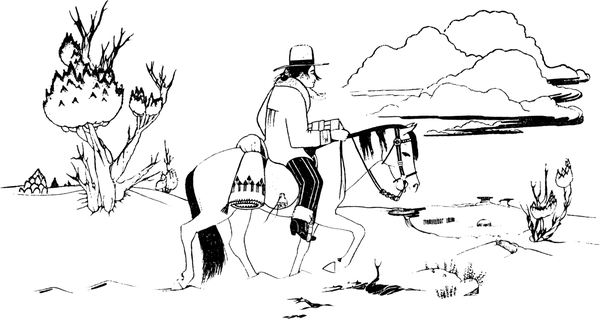
FATHER COMES BACK
We hear my father singing
as he rides along
the snowy trail.
My grandmother goes to her hogan
and my mother and I,
we stand together,
laughing.
We stand together
outside our door,
happy because
my father comes back again.
Behind my father's saddle
is tied
the flour sack filled with food.
It is not empty now,
but a sack
of bumps and bumps,
and heavy looking.
In front of him
my father carries
a dry wood box
that the Trader gave him.
57My mother takes the sack of food.
My father takes the saddle
from his horse.
We go into the hogan
with our bundles in our arms.
My mother breaks the box
with her foot.
She breaks the pieces across her knee.
She feeds them to the fire.
The dry wood box
makes the fire flame dance
in the hogan fire.
My mother puts meat to cook.
She mixes flour and water,
a little ball of lard,
a little pinch of salt
in our round tin bowl.
She takes some out
and pats it flat,
and pats it round,
and pats it thin,
and throws it in
a kettle full of boiling fat.
This hunger pain inside me
is bigger now than I am.
It is the smell of cooking food
that makes it grow, I think.
Soon the fried bread
in the hot fat
swells big and brown.
Soon the meat
in the stew pot
makes bubbling noises.
Coffee boils
smelling strong and good.
The hunger pain
is now so big
I cannot understand
Why I do not see it.
58
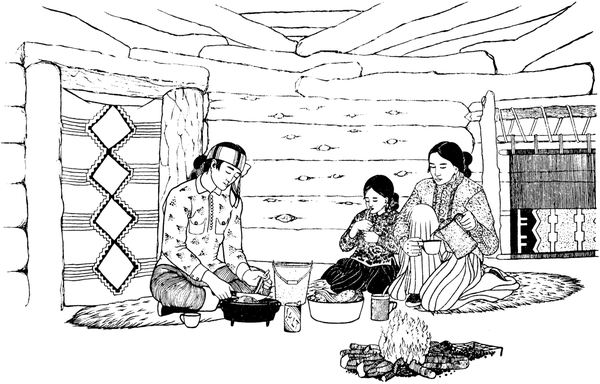
SUPPER
Now we are eating
the good food.
It went somewhere,
but I do not know when,
it left so quickly.
My father tells us
that the wife of Tall-Man's brother
suffers from something.
My father tells us
that tomorrow
there will be a Sing
for this woman
who has sickness.
We will go,
he says,
if the sun shines tomorrow.
We will go to the hogan
of the wife of Tall-Man's brother.
59
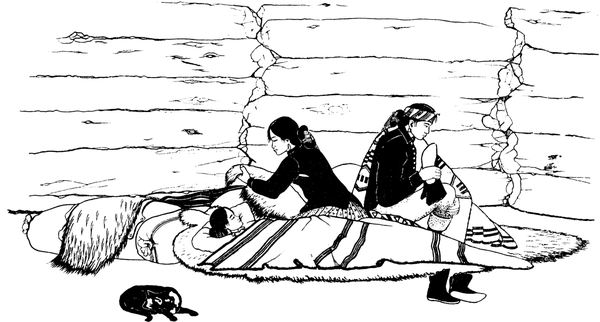
SLEEP
Now that I am warm
and have no pain
and feel well fed
with my mother's good cooking,
I feel sleepy
and glad.
Lying on my blanket bed
on the floor of the hogan,
I say to myself
over and over,
"If the sun shines tomorrow
we will go to the Sing."
60
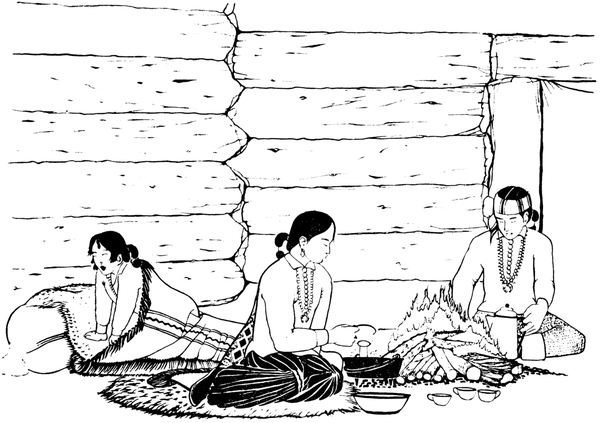
MORNING SUN
Last night went quickly
with sleeping.
I open my eyes
to a beautiful world
of sun and snow.
Everywhere I look
the snow shines
as if someone
had sprinkled it
with broken bits of stars.
My father says,
"snow is good for the land.
When the sun melts it
the thirsty sand
drinks in the snow water."
Grass patches show again.
They look fresh and clean.
The goats hurry about
eating all they can.
Even the sheep move
more quickly,
eating.
61
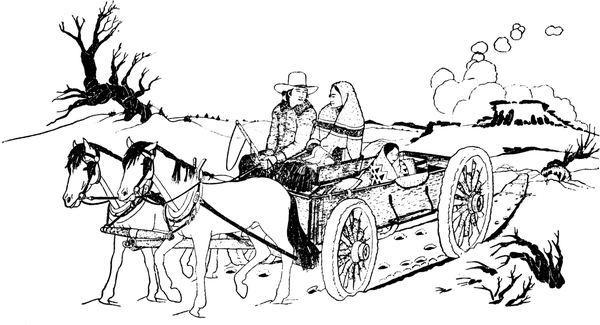
GOING TO THE SING
My father goes for dry wood.
He has to go to the foothills
to get it.
My mother cooks bread and meat.
I sit by the door in the sunshine
and think about the Sing.
My grandmother comes
to my mother's hogan.
She will look after the sheep
while we are gone to the Sing.
Soon we will go
to the Sing,
the Sing.
After awhile
my father comes back with
the wagon.
He piles the wood near the hogan.
He says he is ready
to go to the Sing
and we are ready, too.
Not long after
the sun has finished with the day
we will get there.
We will get to the hogan
of the wife of Tall-Man's brother.
We will be at the Sing,
the Sing,
the Sing.
The ruts in the road
are deep
and frozen.
The wheels of the wagon
have a song of their own.
I sit in the back of the wagon
in a nest made of blankets.
I listen to the song
of the rolling wagon wheels.
My father sits on the wagon seat.
He is driving his horses.
My mother sits beside him.
Straight and tall
my mother sits
on the wagon seat
beside my father.
My father sings
as he drives along.
He sings, "Now is winter.
Warmth is gone from the sands,
from the red rocks,
from the canyons.
In my father's wagon
we go.
Behind my father's horses
we go.
On the trail of the Holy Songs
we go
to hear the voices of the Gods.
63
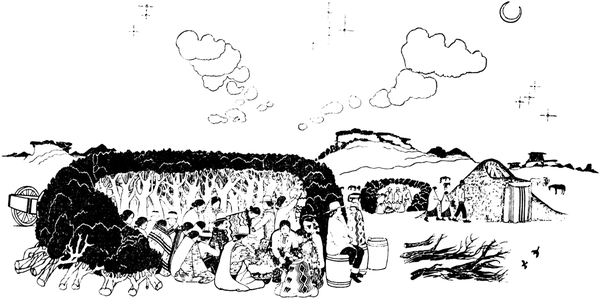
THE SING
It will be a long time
before the night sky bends down
and the stars hang low
and the supper fires
of the camping people
dot the night.
Our wagon
comes within the circles
of supper fires,
comes within the circle
of firelight,
and I see all the People
who have come to the Sing.
There are many People here.
There are many horses here.
There are many wagons here.
It makes me happy to see
all of the People
walking around
and standing and sitting.
It makes me happy to see
all the colors that there are
in the skirts of the women
in the shirts of the men
and in the blankets
that all the People wear.
I can see
the horses,
all the horses.
I can see a race horse
that belongs to a man
my uncle knows.
After the Sing is over,
the men will race their horses.
My father will bet
which horse will win.
And then
perhaps
he will win
a better concho belt
than the one
he has in pawn
to the Trader.
There is a new hogan
built just for the Sing.
There are some shelters
built just for the Sing,
and at one side
is the Cook Shade
where all kinds of foods
are cooking.
The smell of food
makes me happy.
64I think
it is good
to be happy
when food is near.
As it gets darker
more fires are lighted
and within the circle
a big one burns.
Smoke gets in my eyes
and I can taste it
in my mouth.
In the folds of my mother's blanket,
in the warmth of my
mother's blanket,
in the quiet of my
mother's blanket,
close to her heart
I sleep
and awaken
to hear the Gods,
the Singers of Songs.
65Now is the time
for the singing.
Now is the time
for the songs.
We go,
we go,
on the Holy Trail of Song.
We go,
we go,
to hear the voices of the Gods.
They say,
on the path of the rainbow,
they say,
on the bridge of the lightening,
they say
on the trail of pollen
went the Elder Brother,
Reared-in-the-Mountains,
Young Man,
Chief.
We go to hear them say it.
Look! Look!
they say,
they say,
the Gods are walking.
Follow the trail of song.
Look! Look!
they say,
they say,
the Gods are dancing.
Follow the trail of song.
Look! Look!
they say,
they say,
the Gods are singing.
Follow the trail of song.
The sun comes again
to warm the world.
66
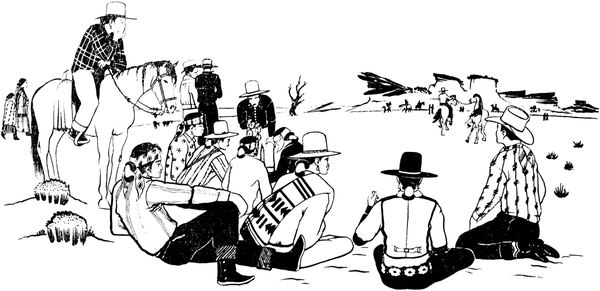
THE BETTING
The men go for horses
that have walked away
to find grass to eat.
The women put blankets
and food in the wagons.
My uncle tells my father
to wait awhile
because
my uncle says
he knows a man
who has a horse
that can win a race.
All the men stand around.
They talk together
about this horse.
My father gets the things
out of the wagon
that my mother has put in it.
He is going to bet them
on this horse
that my uncle says
can win a race.
He does not like the horse
my uncle knows.
He puts up a hundred dollars
against the horse.
All the Indian men
take off their concho belts
and rings and turquoise
and bowguards and blankets.
They throw them on the ground
to make a pile of things
as much as a hundred dollars.
They say,
"We will run
to that place
and back."
One man stands by
the pool of things
that are being bet
against the hundred dollars.
With another man
my father bets his bowguard
against a concho belt
on that horse
my uncle knows.
The men choose a flat place
to run the race.
68
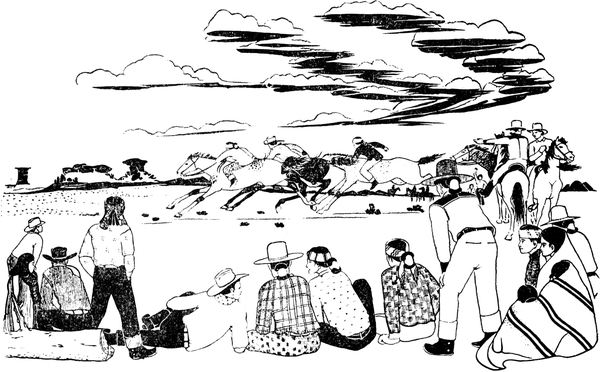
THE RACE
The starter takes his hat off.
He lifts it up.
He lifts it up.
He holds it there.
He drops it.
They are off.
They are off.
They are running together.
No horse is in front.
No horse is behind.
They are together.
Together.
Running, running.
The black one that the Trader likes
stretches out,
running,
running,
gets in front,
running,
running.
Now comes the horse
my uncle knows.
69There he is,
there he is,
in front,
in front,
away in front.
The horse my uncle knows
has won the race.
Their sides go in and out
just like my blouse
goes in and out.
We are tired,
the horses and I are tired.
It takes some running
to win a race.
70
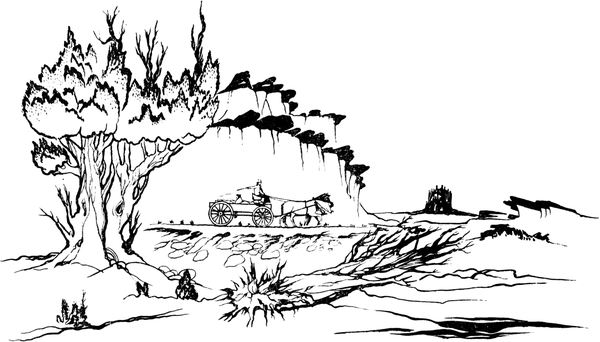
GOING HOME
The horse race is finished.
My father has a concho belt
and money in his pocket.
Now we go back
on the home trail.
We have listened
to the Holy Songs.
We have walked
on the Holy Trail.
We ride along
on the home trail.
71
IN SPRING
72
|
Page |
| Morning |
73 |
| |
| The Hogan |
74 |
| |
| Breakfast |
75 |
| |
| Possessions |
76 |
| |
| Sheep Corral |
78 |
| |
| The Puppy |
79 |
| |
| The Waterhole |
80 |
| |
| The Field |
81 |
| |
| Little Lambs |
82 |
| |
| Herding |
83 |
| |
| Little Bells |
85 |
| |
| Lambs In the Snow |
86 |
| |
| The Wind |
88 |
| |
| Noon |
90 |
| |
| Thinking |
91 |
| |
| Old Grandfather Goat |
92 |
| |
| Baby Goats |
93 |
| |
| Afternoon |
94 |
| |
| Sunset |
95 |
| |
| Greedy Goat |
96 |
| |
| Beautiful Mountain |
97 |
| |
| Meetings |
98 |
| |
| Going Home |
100 |
| |
| Night |
101 |
73
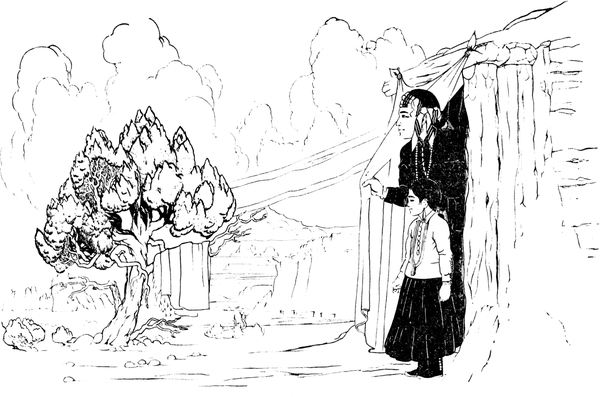
MORNING
This morning,
when I crawled
from under my blanket,
when I stood
before my mother's hogan door,
outside looked
as if it had been crying.
The sky was hanging heavy
with gray tears.
I stood at the door
of my mother's hogan
and looked out
at the gray, sad morning.
He spoke
in a happy way
to me
and to my mother.
Then the gray tears
on the sky's face
melted.
The clouds pushed away
and the sun
smiled through them.
Now it is gray again,
but I cannot forget
that when my father spoke
the sun came
and looked down
upon us.
74
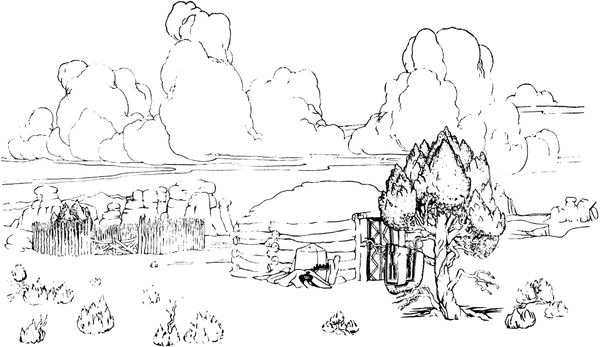
THE HOGAN
My mother's hogan is dry
against the gray mists
of morning.
My mother's hogan is warm
against the gray cold
of morning.
I sit in the middle
of its rounded walls,
walls that my father built
of juniper and good earth.
Walls that my father blessed
with song and corn pollen.
Here in the middle
of my mother's hogan
I sit
because I am happy.
75
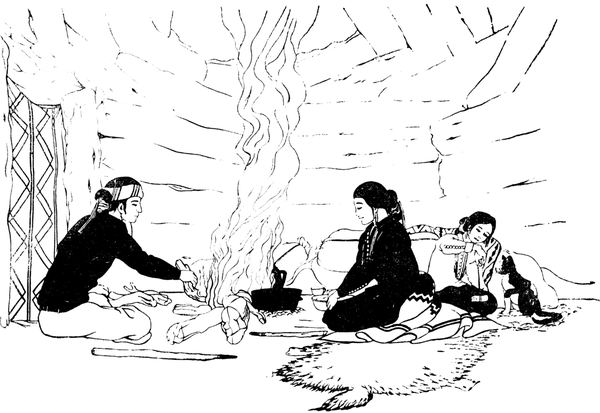
BREAKFAST
On the fire
in the middle of her hogan
my mother cooks food.
My mother
makes fried bread
and coffee,
and she cooks mutton ribs
over the coals.
My father
and I
and my mother,
we sit on the floor
together,
and we eat
the good food
that my mother
has cooked for us.
76
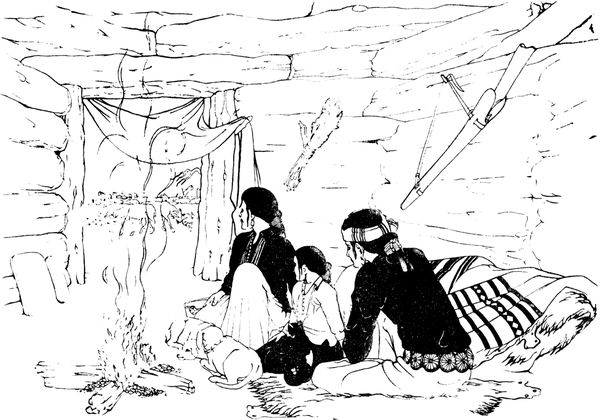
POSSESSIONS
My mother
has many sheep
and goats
and her hogan
and the things
of the hogan
and me.
My father
has many horses.
On his land
he has many horses.
He has a wagon
near the horse corral.
Inside my mother's hogan
my father keeps his gun,
and outside
he hangs his sheepskin
and his saddle
and his blanket.
And I
have my mother
and my father,
three baby lambs
and a cat
with a long tail.
I have a tree
that I know.
It is a crooked tree
on the top of a hill.
It knows me, too,
I think,
because it bends down low
to let me climb it
to hide away.
Behind my mother's hogan
is Beautiful Mountain.
It is mine,
I know,
because always
it is looking at me
to make me happy.
All of us
have many things.
One day
my father told me
that all The People
had possessions.
77He said,
"Sheep and horses
for the men and the women
and land for all.
But I think
there should be more
than sheep and horses
and land for all.
There should be little girls
for little girls to play with.
That would be enough,
I think.
78
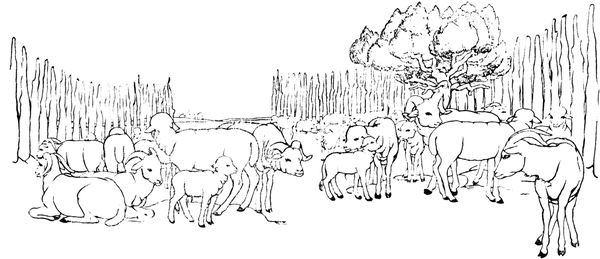
SHEEP CORRAL
Near my mother's hogan
is the sheep corral,
a hard packed place
fenced with poles.
There is a tree
for shade.
There is a shelter
for lambs
in the sheep corral.
The sheep stand together
in their corral.
They stand close
to each other.
I think
sheep like to know
that they are many.
Sometimes
I think that way.
I think
that there are many children
all around me,
all about me.
When I am herding
and I cannot see my mother,
it is good
to play
that many children
stand together with me,
and that all outside
is my corral.
79
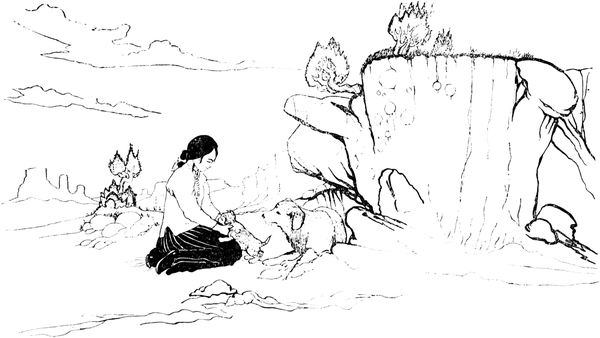
THE PUPPY
Far from the hogan
in a dry sand wash
I found the gray dog
and a new baby puppy
gray with black spots.
Poor little puppy,
it crawled to me
crying.
Thin little baby,
its pink cold nose
found my hand.
Soft baby puppy,
it was so little
it made me feel gentle
and strong
like my mother.
When I picked it up,
the gray mother dog
did not growl.
She was glad for me
to want her puppy.
Listen,
you gray pup with black spots,
I will teach you
to watch the sheep
so that always
there will be a place for you
in our hogan.
80
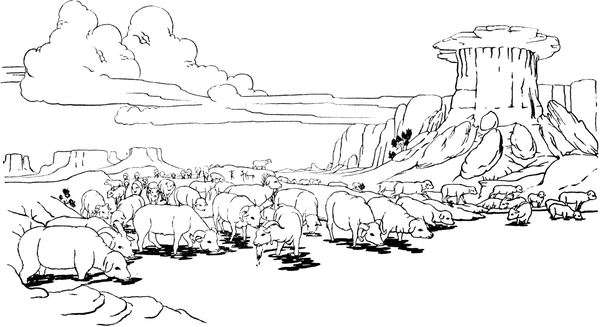
THE WATERHOLE
The waterhole hides away
behind the red rocks,
but my sheep
know where to find it.
Their little feet
have made a deep trail
from the corral
to the waterhole.
81
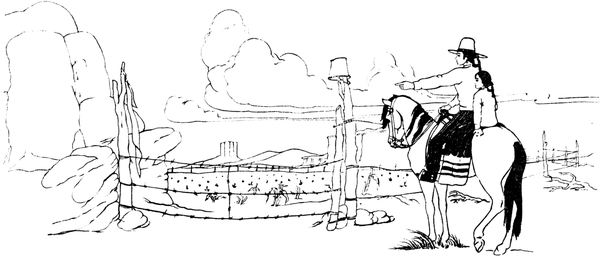
THE FIELD
In a little delta
of seepage water
near the waterhole
is a small place
that my father has fenced
to make a home
for the corn,
for the squash
and the melons.
It is too cold now,
but soon,
when the snow melts
and hides away in the warm sand,
my father will go to his field.
There he will make
the soil ready for planting.
He will break through
the hard crust of winter
and turn up toward the sun
little lumps of fresh earth.
I like to go with my father
to his field
because
I like the feel and the smell
of new earth
when it first sees the sun.
I want my father to take me
with him
when he goes to plant the corn
because
I forget
how he does it.
82
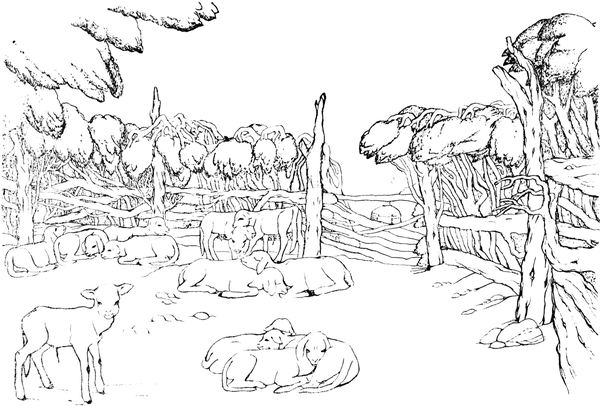
LITTLE LAMBS
The little lambs are born.
Near the waterhole
my mother makes shelters
of green boughs
for the mother sheep.
There
in the shelters
the little lambs are born.
The green boughs
stand close together,
they do not let the snow
nor the wind
nor the sand
come in
to hurt the lambs.
Soon the lambs
will be big enough
to play with me.
83
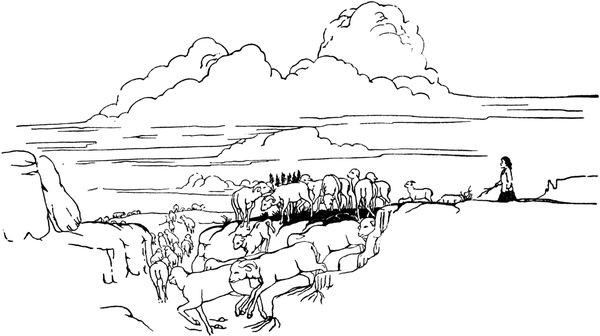
HERDING
All day I herd
my mother's sheep.
The sheep and I,
we have a way of going
that is always the same.
From the corral we go
to the waterhole
and through the arroyo
to the sagebrush
then back again.
Outside is round
like the sheep corral.
Outside is round
like my mother's hogan,
but it is bigger.
Outside is big,
big,
so big.
Sometimes
when I am alone
with my mother's sheep,
I am afraid.
84I cannot say
with words
the things
that make me afraid
because I do not know
what they are.
But sometimes
outside is so still
and big
and empty
and I am so little.
The red rocks
are so high
and Beautiful Mountain
behind my mother's hogan
seems far away.
Nothing walks with me,
but the sheep,
just the sheep,
and I am so little
walking along
in the big outside.
I am so little,
I am afraid.
And then
near by
I see my mother
at her hogan door.
The red rocks
seem to bend down
to look at me
in a good way
and Beautiful Mountain
comes closer.
All things are good again
because
my mother is near me.
There is wind
and snow
and sand
and always wind.
I take the sheep
to the waterhole
and the wind goes with us.
85
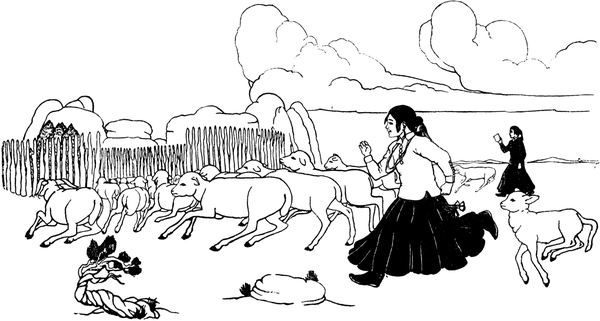
LITTLE BELLS
I have little bells
on my belt fringe.
Little bells,
silver bells,
hanging on my belt fringe.
My mother has a tin can
filled with stones.
She rattles it
to tell the sheep
to hurry.
But I have little bells
tied to my belt fringe.
When I run
the little bells laugh
and say to the sheep,
"Hurry,
hurry."
86
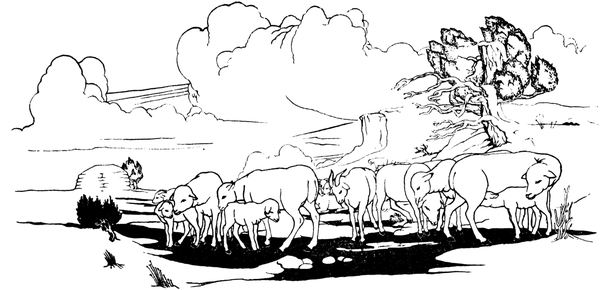
LAMBS IN THE SNOW
Today
the cold comes
in gray clouds
of blowing snow.
The little lambs
stand close to their mothers.
They think
the cold has come to stay.
Yesterday the sky was blue
and the sun warmed the land.
The lambs do not know
that sometimes
cold days make mistakes
and come again
after they should have gone away.
They do not know
that tomorrow will be warm again.
87They have not been here
long enough
to know these things
and their mothers
have not told them.
My mother
is watching the lambs.
She will not let them
get too cold.
My father says,
"Next year
I will try the white-man's way
of breeding the sheep.
Then the lambs
will be born later,
when summer has come to stay."
My mother says, "Yes,
next year
we will try that way."
88
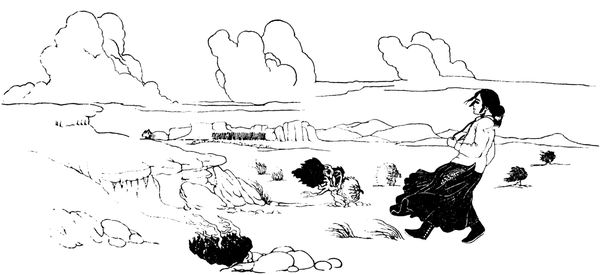
THE WIND
There are many things
about the wind
that I do not know.
I have not seen the wind,
and no one has told me
where the wind lives,
or where it is going
when I hear it
and when I feel it
rushing by.
And something more
I do not know about the wind.
I do not know if it is angry
or if it is playing
and just doing the things it does
for fun.
Sometimes
the wind gathers the sand
into whirlwinds
and makes them dance
over the flat lands
until they are tired
and lie down
to get their breath.
Sometimes
the wind bends the wild grass
down to the ground,
and makes the sagebrush
bow its head
as if a giant moccasin
had stepped on them
in passing.
Today the wind makes the
tumbleweeds
look like sheep
jumping off high banks
and racing up arroyos
with no dog to guard them,
with no herder to guide them.
Poor tumbleweeds are frightened
because
they do not know where to go.
I want someone to tell me
if the wind is angry
or if it is playing with me
and racing with me
and my many skirts
across the sand.
89When the wind blows
my long skirts,
my many skirts
are in a hurry
to get to the hogan
where the wind
cannot push them.
They pull me along
when I am walking
and my feet
have a hard time
to keep up
with my skirts.
90
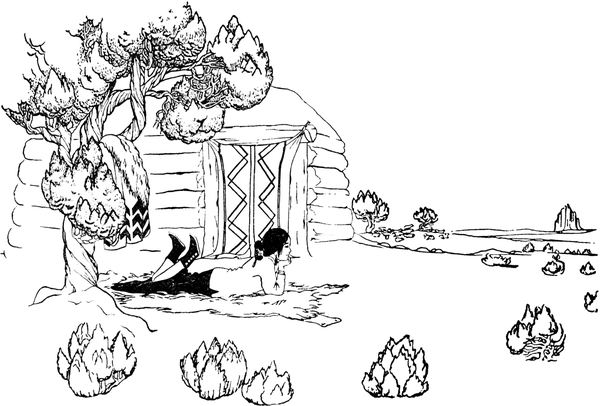
NOON
Now it is middle-time of day.
The shadows sit under the trees.
Everything is resting,
the sun
and the sheep
and the shadows.
And I look at Beautiful Mountain
behind my mother's hogan.
I am thinking about something.
91
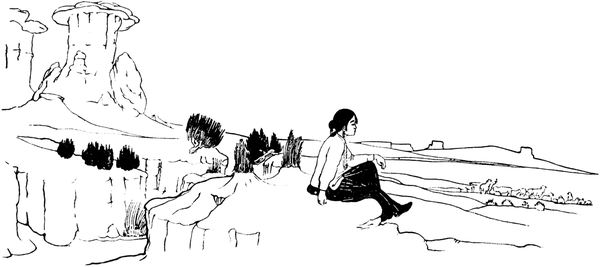
THINKING
Earth,
they are saying
that you are tired.
They are saying
that for too long
you have given life
to the sheep
and The People.
I cannot do big things,
but I can do this for you.
I can take my sheep
to new pastures.
I can take them
the long way
around the arroyos,
not through them,
when we go to the waterhole.
This way
their little feet,
their sharp pointed feet,
will not make the cuts
across your face
grow deeper.
This way
the worn pastures
can sleep a little
and grow new grass again.
I can do this
to heal your cuts,
to make you
not so tired.
Earth, my mother,
do you understand?
92
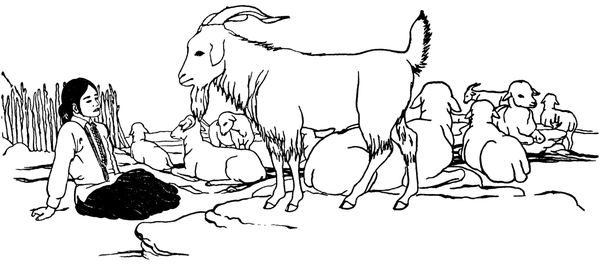
OLD GRANDFATHER GOAT
Grandfather Goat
stands on the hilltop,
shaking his whiskers,
chewing something
and looking wise.
Sometimes
when I ask him things
he looks at me
as if he knew.
93
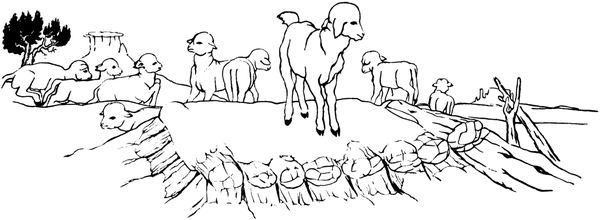
BABY GOATS
Baby goats
always are playing,
climbing up
and jumping down.
This small one
always stands
on the top of the storehouse.
He knows
there are things to eat inside,
I think.
94
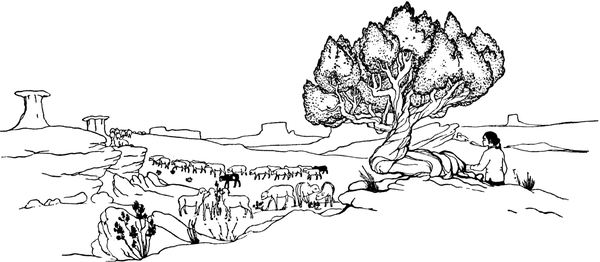
AFTERNOON
The sun goes slowly
across the sky.
The sheep walk slowly,
feeding.
I see them against the sky
in a long, slow line.
I whisper to the wind
to blow the sun
and the sheep
a little
to make them hurry.
But it blows
only the clouds
and the sand
and me.
95
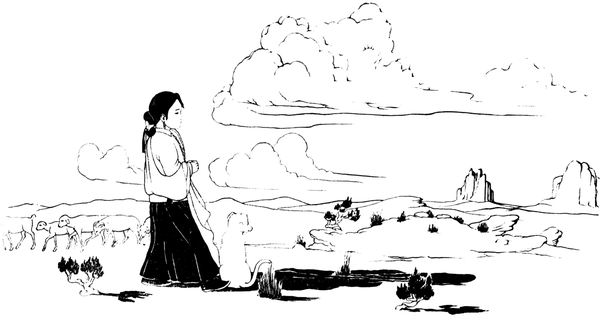
SUNSET
Just now
I watched the sun going.
It took a long time
to say goodbye.
I think it knew
that the land
and the things
of the land
were sorry
it had to go.
It said goodbye
in such a good way.
Just for a little time
it made the sky
and the rocks
and the sand
like itself
to let them know
how it feels
to be sun.
Then it went away
and all things
were still
because the sun had gone.
96
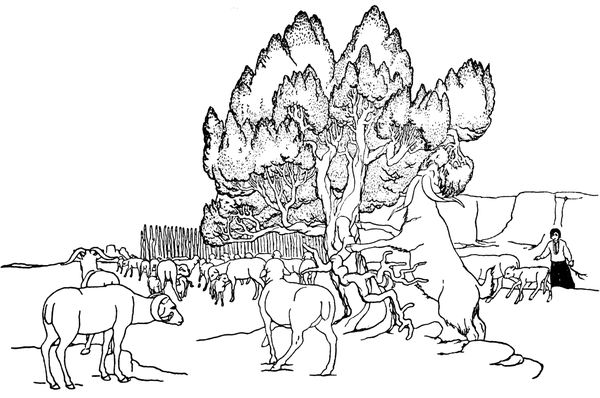
GREEDY GOAT
The sheep know
that the day is over,
but Grandfather Goat
stays behind
to push his whiskers
high up in a tree
for one last bite.
Old Greedy
Grandfather Goat.
97
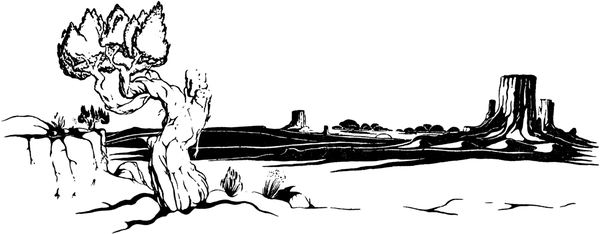
BEAUTIFUL MOUNTAIN
Beautiful Mountain
looks so blue
and so cold
and so lonely
now that the sun
and the sheep
and I
are going.
If it were nearer to me
and small,
I could bring it
into my mother's hogan
under my blanket.
Then I need not leave
Beautiful Mountain
out there by itself
in the night.
98
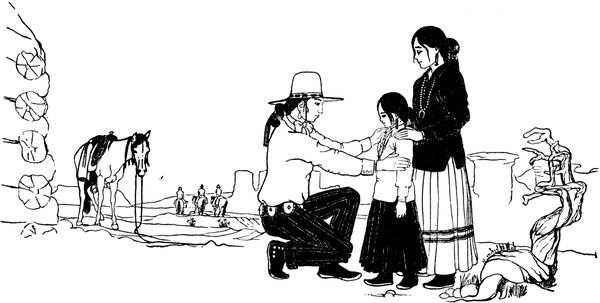
MEETINGS
For a long time
there have been meetings
of many men
for many days.
At the meetings
there is talking,
talking,
talking.
In the morning
when my father
leaves for meeting
he says to us,
"When I come here again
then I will know
if it is best
to have many sheep
or few sheep,
to use the land
or let it sleep."
99But
when my father
comes home from meeting
he does not know
which talking-way to follow.
Tonight
when my father
came home from meeting
he just sat, looking
and looking.
My mother gave him coffee
and bread and mutton,
but my father just sat,
looking.
Then my mother
spoke to me.
She said,
"A meeting is like rain.
When there is little talk,
now and then,
here and there,
it is good.
It makes thoughts grow
as little rains make corn grow.
But big talk, too much,
is like a flood
taking things of long standing
before it."
My mother
said this to me,
but I think
she wanted my father
to hear it.
100
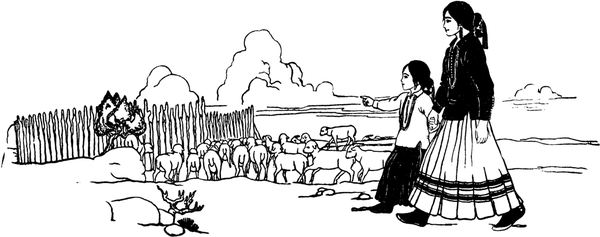
GOING HOME
After the sun has gone,
my mother's sheep
and I,
we walk together, slowly,
to my mother's hogan
and the corral.
Most all the day
my mother
from her hogan door
has watched me
and the sheep
to see
that no harm came to us.
And now
my mother comes to meet us.
She comes to welcome us
as if we had been gone
a long way,
a long time.
Sometimes
my father's singing
comes to meet us
across the sandwash.
It comes to meet us
to sing us home.
Sometimes,
the smoke
from the supper fire
comes to meet us
across the dark blue
of the night sky.
For me the hogan is waiting
and the corral
waits for the sheep.
101
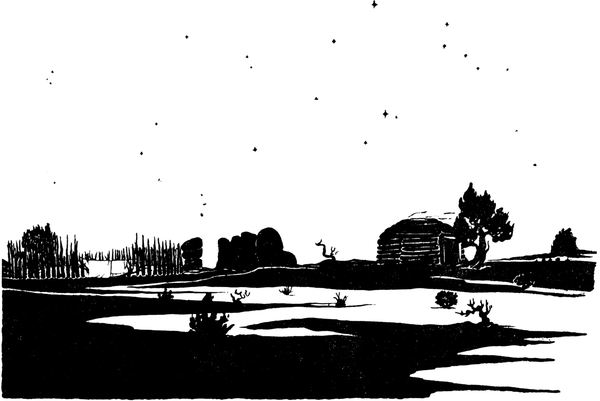
NIGHT
Night is outside
in his black blanket.
I hear him
talking with the wind.
102I am here
in my mother's hogan
warm in my sheepskin
close to my mother.
The things I know
are around me
like a blanket,
keeping me safe
from those things
which are strange.
103
IN SUMMER
104
|
Page |
| |
| Today |
105 |
| |
| Packing |
106 |
| |
| Goodbye To My Hogan |
107 |
| |
| Goodbye |
108 |
| |
| Ready To Go |
109 |
| |
| Goodbye Gray Cat |
110 |
| |
| Across the Sand |
111 |
| |
| Goodbye To Grandmother |
112 |
| |
| Riding |
113 |
| |
| Noon in the Sagebrush |
114 |
| |
| Night Camp |
115 |
| |
| Up the Trail |
116 |
| |
| Summer Range |
117 |
| |
| The Lake |
118 |
| |
| Shelter |
119 |
| |
| The Sheep Corral |
120 |
| |
| Dawn |
121 |
| |
| Morning Prayer |
123 |
| |
| The Sheep |
124 |
| |
| The Goats |
126 |
| |
| Herding |
127 |
| |
| Noon on the Mesa |
130 |
| |
| Afternoon |
131 |
| |
| Playmates |
132 |
| |
| Possessions |
134 |
| |
| Storm |
135 |
| |
| Lightning |
136 |
| |
| Fire |
137 |
| |
| Rain |
138 |
| |
| Evening |
139 |
| |
| Supper |
141 |
| |
| Talking |
143 |
| |
| Sheep Dipping |
145 |
| |
| Bedtime |
146 |
| |
| The Star Song |
147 |
| |
| The Artist |
149 |
105
TODAY
Today
we leave my mother's hogan
my mother's winter hogan.
We leave the shelter of its
rounded walls.
We leave its friendly center fire.
We drive our sheep to the mountains.
For the sheep,
there is grass and shade
and water,
flowing water
and water standing still,
in the mountains.
There is no sand
up there.
106
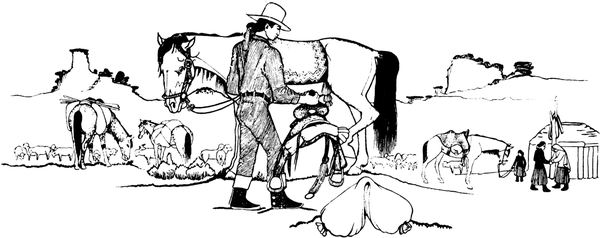
PACKING
My mother's possessions
we tie on the pack horses,
her loom parts
and her wool yarns,
her cooking pots,
her blanket
and my blanket
and the water jug,
white sacks filled with food,
cans of food,
cornmeal and wheat flour,
coffee and sugar.
My mother's possessions,
we tie them all on the
pack horses.
The packs must be steady.
The knots must be strong.
I cannot pack the horses,
I am too little,
but I can bring the possessions
to my father and my uncle.
I am big enough for that.
107
GOODBYE TO MY HOGAN
My mother's hogan,
I feel safe
with your rounded walls
about me.
But now I must leave you.
I must leave your fire
and your door.
I must go with them
to a place they know,
but that is strange to me.
I put my moccasins,
my precious moccasins,
by your fireplace, my hogan,
so you will not be lonely
while I am gone.
108
GOODBYE
Land
around my mother's hogan
and sheep trail
and arroyo
and waterhole,
sleep in the sun
this summer.
Rest well
for my sheep
will not be here
to deepen the trail and arroyo
with their little sharp feet.
They will not be here
to eat the short grass,
to drink the stored water.
Sleep,
rest well,
and be ready for our return.
109
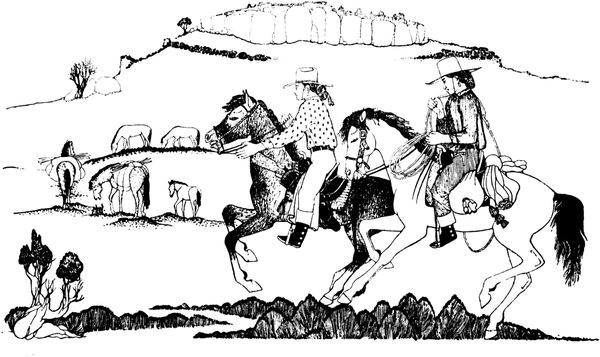
READY TO GO
My mother scatters the ashes
from her cooking fire.
She sweeps the hogan floor
with her rabbit-brush broom.
My father lays the bough
across the door
to show that we have gone.
They run around the sheep corral
telling the sheep
we are ready to go.
The young corn in the field
hangs its tasseled heads.
Young corn,
my grandmother is staying
at home.
She will take care of you.
My father mounts his horse.
He drives the pack horses before him.
My uncle mounts his horse.
They ride away together,
singing,
across the empty sand.
110
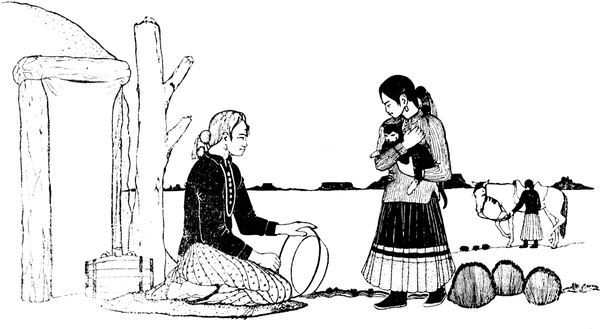
GOODBYE GRAY CAT
Gray Cat,
I am telling you goodbye.
Today I go to the mountains.
I take my sheep to summer range,
but you, Gray Cat,
you have no sheep
so you must stay at home.
Stay here with my grandmother,
Gray Cat.
111
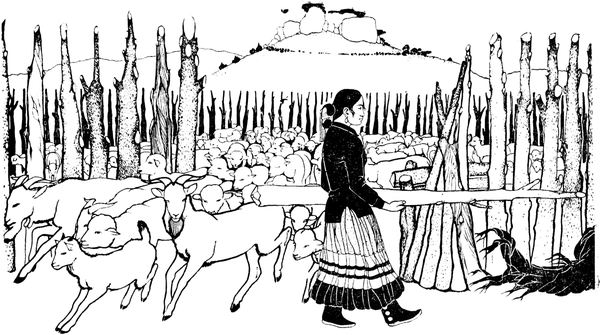
ACROSS THE SAND
My mother lets down the bars
of the sheep corral.
The flock crowds around her.
I think they are saying,
"We know where we are going."
The little lambs
walk close by their mothers.
They are like me,
they do not know
if they will like this place
where we are going.
My mother and I,
we drive our sheep
across the sand.
My grandmother
stands at her door
looking after us.
112
GOODBYE TO GRANDMOTHER
My grandmother,
my little grandmother,
now I am leaving you.
Last year I was too small
to go to the mountains.
I stayed with you,
but this year I am big,
I am almost tall
so I must help drive the sheep
to summer range.
My grandmother,
my little grandmother,
do not be lonely.
113
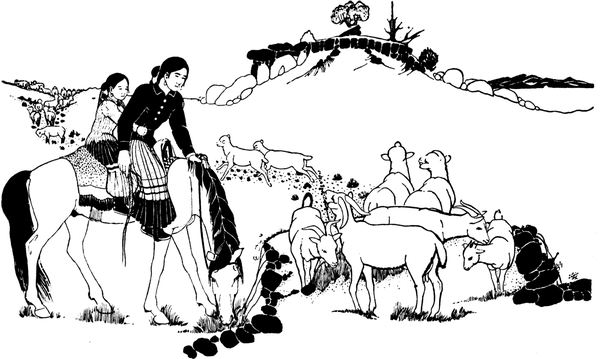
RIDING
Riding,
riding,
riding on my horse
to herd the sheep
across the yellow sand.
Yellow sand is around me.
I ride in the middle
of a sand and sun filled world.
Riding,
riding,
riding on my horse
to herd the sheep
across the yellow sand.
Sun heat
and sheep smell
and sand dust
wrap around me
like a blanket
as I ride through the sand
with my sheep.
114
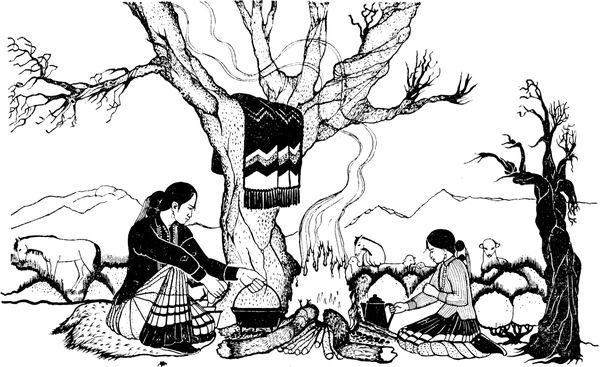
NOON IN THE SAGEBRUSH
At noon
we reach the sagebrush flats.
Gray-green sagebrush scents the air.
Gray-green sagebrush softens
the yellows of the land.
My mother makes a little fire
no bigger than her coffee pot.
Food is good
and rest is good
at noon
in the sagebrush.
115
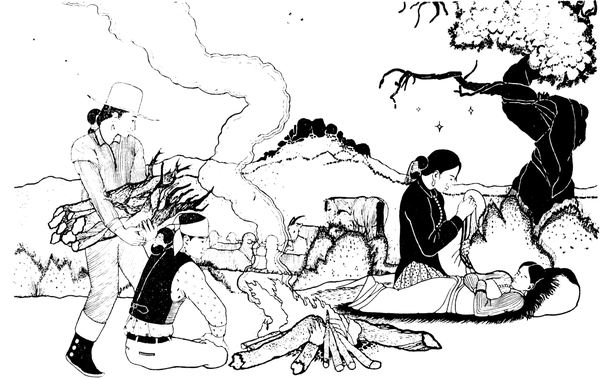
NIGHT CAMP
At night we make camp
in the juniper covered hills.
My father is waiting for us there.
The moon looks down
on the restless sheep
on the hobbled horses.
The moon looks down
on a shooting star.
But I am too tired
to look at anything.
116
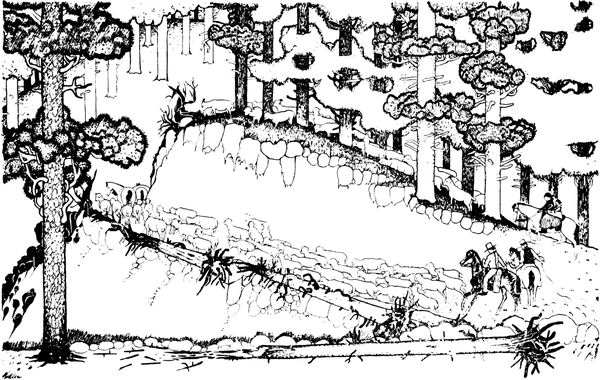
UP THE TRAIL
Morning sunrise sees us climbing
up and up
on the mountain trail.
There are pine trees
standing straight and tall.
Brown pine needles
and green grass
cover the ground.
Shadows play with the sunlight.
The sheep hurry upward,
climbing and pushing
in the narrow trail.
His feet stumble
in the narrow trail.
All day long
the sheep climb upward.
They want to eat
and I am hungry, too,
but my mother says,
"No."
All day long we ride
to herd the sheep.
Night is almost with us
when we reach the top.
117
SUMMER RANGE
Summer range in the mountains
is on a high mesa,
a steep, high mesa,
a flat-topped mesa,
with tall growing pine trees,
with short growing green grass,
with little, winding rivers
and rain filled lakes.
This is summer range for our sheep.
118
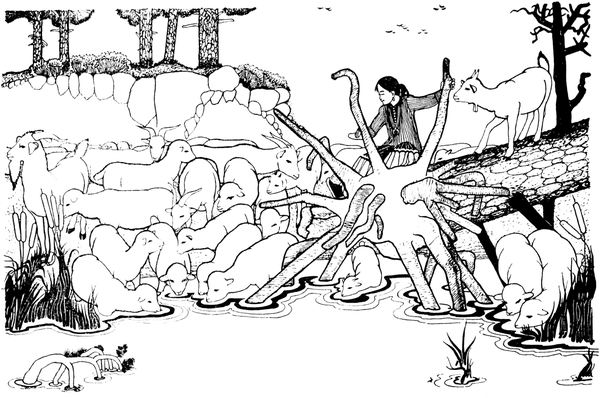
THE LAKE
Between the trees
I see water standing
in a bowl of green rushes.
It is still
and blue
and cold.
It is a lake
with land all around it.
The sheep drink
long and steadily.
They stand in the shallow water
at the edges of the lake.
Their little pointed feet
dig deep into the mud
of the lake banks.
I see colored fish
beneath the water
swimming in a rainbow line.
I throw stones into the lake.
The water pushes back in circles
to take the stones.
The dogs swim far out
into the cold waters.
They are thirsty and hot.
I have never seen a lake before.
Gentle rain pools I have seen
and angry flood waters,
but never before
a still, blue lake.
119
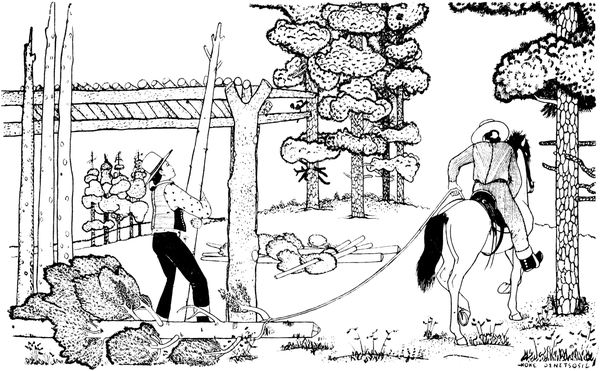
SHELTER
Beneath the trees
I see our summer shelter.
My father and my uncle
have made a shade
to shelter us from night rains
and from the cold
of near-by snow peaks.
They have made us a shade
of cottonwood boughs
and juniper bark.
It has the clean smell
that trees give.
120
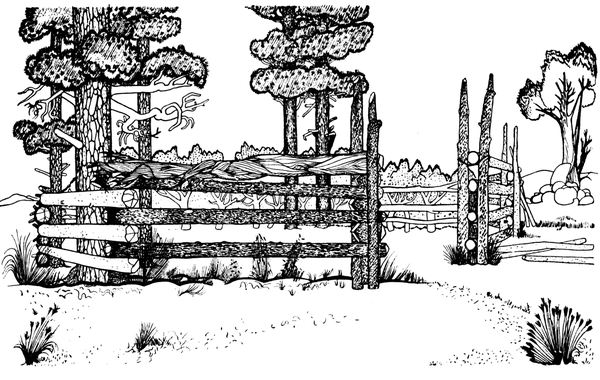
THE SHEEP CORRAL
My father and my uncle
made a sheep corral
while they were waiting
for the sheep and for us
to come up the trail.
They made the sheep corral
of branches,
a circle of branches,
a circle of dark colored boughs.
The sheep stay safe
in their corral tonight
and I sleep
beneath the cottonwood shade.
121
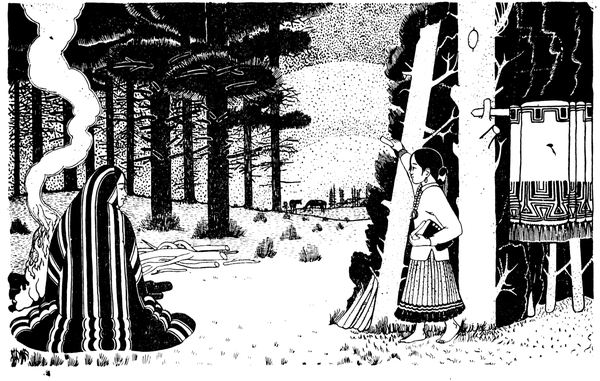
DAWN
This morning
when I opened my eyes from
sleeping I could not remember
what place this is.
I thought I was in
my mother's winter hogan.
Tall trees stretch above me.
In the darkness
they look blacker than the night.
As I lie here,
safe and warm beneath
my blanket,
all around me turns to gray mist,
all around me turns to silver.
Darkness is gone,
but it made no sound.
The world is still asleep.
Through the pine trees
day comes up
light comes up.
122In the pine trees
bird wings are stirring,
bird songs are stirring.
The grass beside my blanket
is wet with night rain.
Morning mist is on the leaves
and in my hair.
I put one toe out,
one brown toe out.
It is hard to get up
when it is cold.
Blue smoke from my mother's fire
curls upward in a thin blue line.
The sheep move inside their corral.
I come out from under my blanket,
from under my warm blanket.
Like the other things around me,
I come out
to greet the day.
123
MORNING PRAYER
Silent and still
my father stands
before our summer shelter.
He is thinking a prayer
to the Holy Ones,
asking them
this day
to keep our feet
on the trail of Beauty.
Filling the silence
of my father's prayer
I hear the bluebird's song.
124
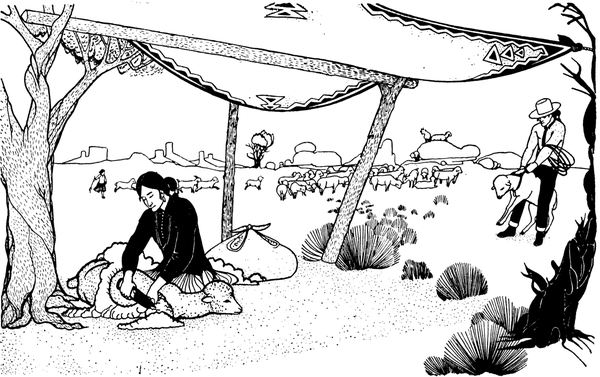
THE SHEEP
Their winter wool was cut off
last week
at shearing time.
When early summer painted
flowers on the desert
with bunches of new grass,
when snow water melted
and softened the hard earth,
when Sun-Bearer smiled
on the sheep and the people.
Then my mother said,
"Now,
it is shearing time."
My mother said that last week.
Last week it was shearing time.
Last week
at shearing time,
my mother caught her sheep.
One by one she caught them.
She tied their feet together
and with her shears
she clipped their wool.
125My mother's hands were sure.
She cut the wool but once
from underneath.
She did not fumble,
cutting it here and there
into short pieces.
She cut the wool but once.
My mother's hands were strong.
She pulled the wool back.
She folded it back
to come off in one piece.
My mother's hands were strong.
The sheep lay still
beneath her gentle fingers.
Trusting my mother's hands,
the sheep lay still.
But now
the poor sheep are cold.
They stand in their corral
this morning
and shiver
and bleat
and call loudly
for the sun
and for me
to come.
126
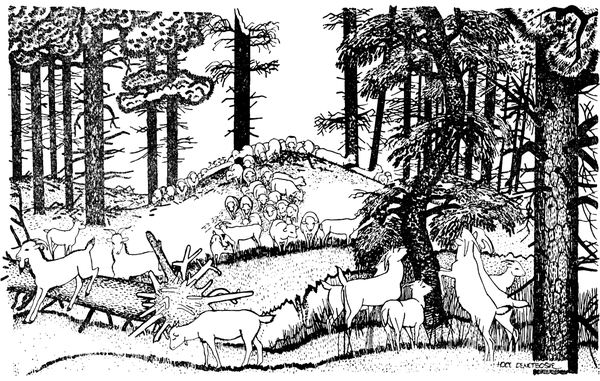
THE GOATS
They go first into everything.
My uncle says in the English,
"Goats are tough."
Goats eat the grass too far down.
They eat the trees too far up.
My uncle says in the English,
"Goats are tough."
Goats, more than sheep,
get into my mother's stew pot.
Their meat is good,
but it takes chewing,
too much chewing.
I say with my uncle,
"Goats are tough."
127
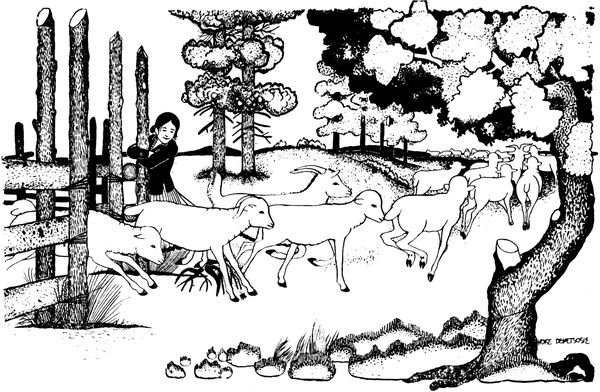
HERDING
After we have eaten our morning food,
my father and my uncle
ride down the steep trail
to the Trading Post.
My mother kneels beside her loom
before the cottonwood shade.
I see the sun on my mother's
brown hands.
I see the sun on my mother's
black hair.
I give my mother a long look,
then I turn my back.
I walk to the sheep corral.
The wet grass parts
to make a way
to let me pass.
I walk to the sheep corral.
The flowers move back
to make a way
to let me pass.
I walk to the sheep corral.
The sheep go first
and I follow.
The sheep walk slowly
for they like to eat
the short sweet grass
under the trees.
I walk slowly
for I am lonely.
I know that my mother sits
before our shelter
weaving a blanket at her loom.
I know she is near me,
but I cannot see her.
I can see only tall trees
and bits of sky.
I am a child of the yellow sand.
Mesa top and pine trees,
green grass and colored flowers
are strange to me.
Unknown things live here.
I creep to the edge of the mesa
while my sheep are feeding.
128Far, far below me
is the world I know,
the yellow world
of sand and wind
and sand.
Far below
I see sheep walking,
someone's sheep walking,
in a dust cloud
of their own making.
Far below
I see a sand whirl
made by an angry wind
fighting the land.
Far below
I see the heat haze,
colored heat haze
blanketing the desert.
I see these things
through tears
for they are the things
I know.
I am lonely without them.
Here on top of the mesa
is a strange world
of shadows and water
and grass for the sheep.
129Grass for the sheep,
I had forgotten that.
Grass for the sheep
to give them life,
to make them strong.
Here on top of the mesa
there is grass for our sheep.
Surely the gods are good
who live here.
The quiet of the mesa
pushes against me.
I can feel it, heavy, heavy,
it pushes against me.
Surely, the gods who live here
are known to me.
The words of the Holy Song
are known to me.
"On top of the mountain
are found the gods."
These are the words
of the Holy Song.
130
NOON ON THE MESA
Day grows long
and bright with sunlight.
The sheep eat their way
to the rain lakes
under the willows.
Little rivers run through the tall grass
and hide away in the rushes.
I see a line of scattered clouds
across the sky.
Sun-Bearer rests
on his way
to the House of Turquoise Woman
in the Western Waters.
It is the middle-time of day.
131
AFTERNOON
Lying on my back
under the willows
I can see an eagle flying
far above
in great circles
against the blue.
I feel
and see
and listen,
but I do not talk.
There is no one to hear me.
There is no one to play with me,
only the lambs and the baby goats
and they like each other
better than me,
I think.
132
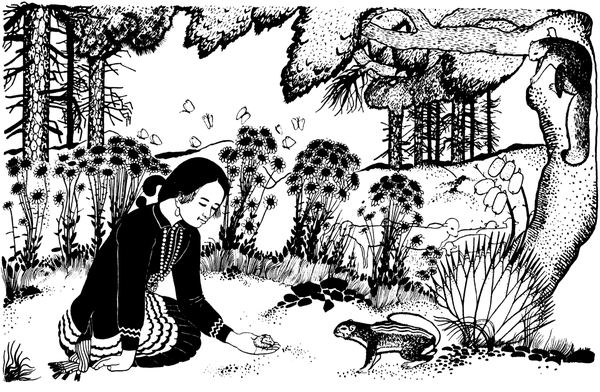
PLAYMATES
There are butterflies,
small white butterflies
above the flower plants
of purple iris.
I hear the whispering
of white wings flying.
I think they like my velvet blouse.
I think they like my long black hair
because they come to me
and to the purple iris,
those small white butterflies.
A little fat chipmunk
in a brown striped blanket
comes close to me.
He wrinkles his nose and looks at me.
He holds it in his hands
and with little quick bites
stores it away
in his fat brown cheeks.
Funny little chipmunk
in his brown striped blanket
with storerooms in his face!
133Gray squirrels with bushy tails
run up and down the trees.
I pull my skirts around me
and follow the squirrels.
Now I know where they live.
Now I know where I can find
piñon nuts this autumn.
I feel the warmth
of Sun-Bearer's shield
against my back.
And on my face
I feel cool fingers
of rain-cloud shadows.
With my hands on the warm earth
beside me,
almost,
I can feel things growing.
Why did I think
I was alone?
134
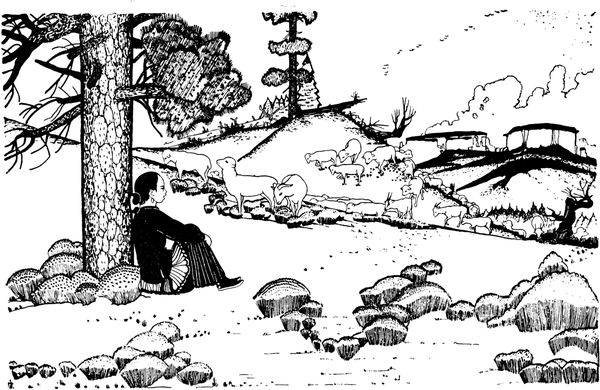
POSSESSIONS
I am making a song
to sing to myself.
It is about my possessions.
My mother made them for me.
My mother gave them to me.
I have silver rings on my fingers.
I have silver bracelets on my arms.
My father made them for me.
My father gave them to me.
Soft things
and hard things
I have for my possessions.
A song,
a song,
I am singing a song about them.
135
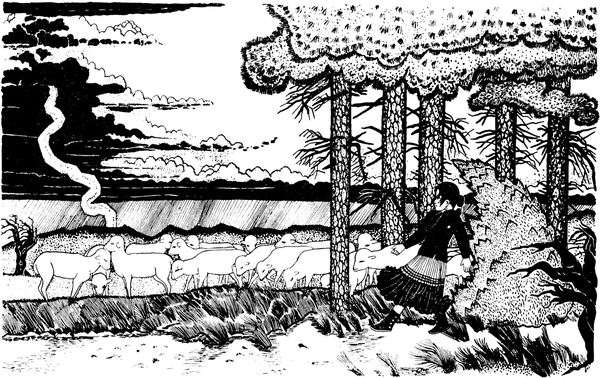
STORM
A storm wind comes to stop my song.
It comes through the trees
with the strength of anger.
It turns me when I am walking.
Black clouds gather
to blanket the thunder.
Zig-zag lightning
cuts the clouds in two.
With soft words I speak to them.
I tell them
not to be afraid
for I am here.
136
LIGHTNING
Lightning darts
like an arrow,
an arrow of fire,
from an unseen bow.
It darts in flame
from the gray sky
to the gray earth.
Lightning strikes a tree.
My sheep,
my sheep,
I must save my sheep
from this evil around them.
I must save them,
my sheep,
my poor frightened sheep.
137
FIRE
Fire runs up the tall tree trunk
and into the branches.
The sheep look to me to protect them.
My poor frightened sheep,
I do not know which way
to take them.
138
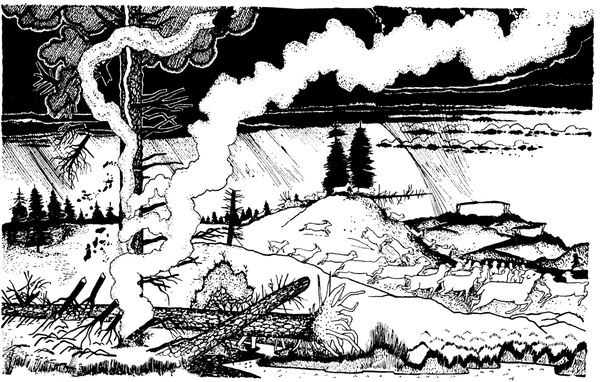
RAIN
Male rain comes through,
comes down in sheets of water,
pours down in sheets of water
drenching the flames
of the burning tree.
My mother comes running
between the trees.
She is frightened for the sheep
and for me.
I tell her
all things are good.
Lightning did not touch the sheep.
Male rain saved the trees from fire.
Male rain saved us from forest fire.
Now male rain has gone
down into the valley.
Female rain follows
with soft footsteps.
Leaves turn upward
lifting their hands
to catch the gentle rain.
I open my hands
to catch the gentle rain.
139
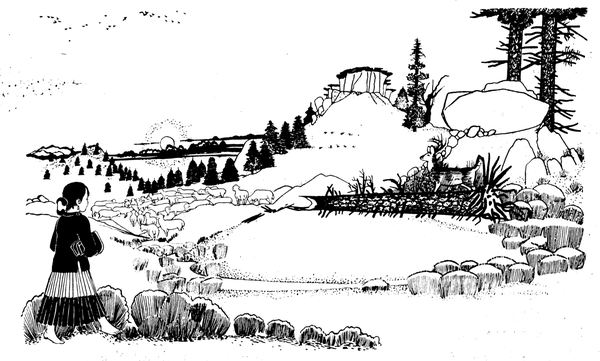
EVENING
Sun-Bearer parts the clouds
and looks down on the rain.
He turns each raindrop
into a silver bead.
He turns each rainstreak
into a silver necklace.
He makes a rainbow path
for the gods
across the sky.
I go among the sheep,
the huddled, wet sheep.
I sing to the sheep,
a song, a song,
a song about my possessions,
my ceremonial goods.
I have a little buckskin bag
filled with things,
with things.
My grandfather filled it for me.
My grandfather gave it to me.
Wherever I go
I carry my little buckskin bag
to keep me safe,
to keep my feet
on the Trail of Beauty.
140A song,
a song,
I am singing a song
to my sheep.
Just now on the home trail,
a young deer,
a beautiful young deer,
stood in the bushes
and looked at me.
His eyes were big and dark
and full of questions.
A song,
a song,
I am singing a song
on the home trail.
I have a necklace of
turquoise and coral.
I have a necklace of
white shell and coral.
My grandmother traded for them.
My grandmother gave them to me.
I have turquoise in my ears,
silver bells on my belt fringe.
My uncle made them for me.
My uncle gave them to me.
A song,
a song,
I am singing a song
to my sheep.
My father has five kinds
of possessions.
He has hard goods
and soft goods,
ceremonial goods
and land
and game.
I do not have five kinds.
I made a song about them
to sing the sheep home.
At last we reach the home camp.
The sheep are safe in their corral.
I am safe with my mother.
Summer shade is at my back.
In front of me is my mother's fire.
My mother sings,
and all around me
there is beauty.
141
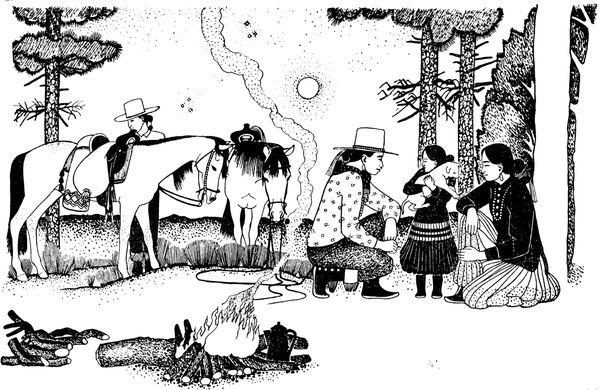
SUPPER
My father and my uncle
ride up from the Trading Post,
the Red Rock Trading Post
down near the winter hogan.
Long before I heard them
I could feel them coming.
Long before I saw them
I could hear them singing.
Now they ride into the firelight,
my father and my uncle.
My father brought salt
and baking powder
and lard
for my mother
from the Trading Post.
My father brought news,
much news.
142Things he had seen,
things that were told to him
at the Trading Post.
He brought them back
for us to hear.
Then we washed our hands.
We sat away from the fire.
My mother placed the evening food
before us.
When we had eaten
my father gave thanks
to the Holy Ones.
We washed our hands again.
My uncle put new wood upon the fire.
Then the best part of the day began.
My father and my uncle talked.
143
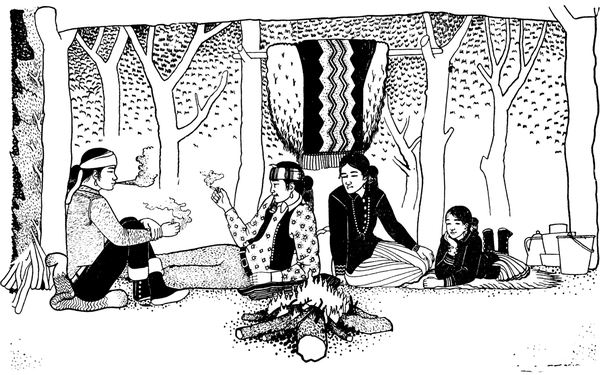
TALKING
My father said
in ten days
would be the time
for dipping the sheep.
He and my uncle
would help my mother and me
drive the sheep to the dipping.
Sheep must be dipped
in medicine-water.
There is no Trail of Beauty
in this medicine water.
But my father says
it is good for the sheep.
Sheep get lice
hidden in their thick wool.
Lice make the sheep unhappy.
Lice make the sheep bite their wool.
Dipping the sheep
in medicine-water
kills the lice.
Ticks live
on the sheep's good blood.
Ticks make the sheep thin
and weak.
144If the sheep are robbed
of their good blood
they cannot stand
the cold of winter.
They cannot stand
the heat of summer.
Dipping the sheep
in medicine-water
kills the lice and the ticks.
It is good for the sheep.
My mother does not like dipping
because she does not understand
why the sheep are dipped.
But my father talks to her.
He tells her about lice and ticks.
He tells her too
that she is quickest and best
of all the women
at dipping her sheep
in the medicine-water.
145
SHEEP DIPPING
All the people
with their sheep and goats
and horses and wagons
and children and dogs
go to the dipping.
There is much dust and work
and singing and eating
at dipping time.
Sheep do not like dipping.
They do not like to take a bath
in the medicine-water
even though it is good for them.
When grandfather goat gets dipped
he is angry, very angry.
He does not like
to get his whiskers wet.
Tomorrow, first thing,
I will tell old goat, old goat,
that in ten days
Washington will
wash his whiskers.
My father talks of other things
besides the dipping.
His voice goes on and on
like wind in trees,
like water running,
like soft rain falling,
like drum beats pounding,
talk,
talk,
talking.
146
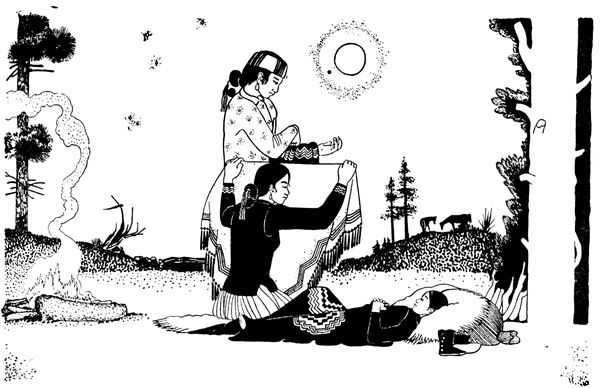
BEDTIME
After a time
my mother and I
unroll our blankets.
We go to bed
beneath the cottonwood shade.
I have my own prayer
to the night.
I whisper it,
whisper it,
but only the night wind hears.
The horses move
within the shadows.
The sheep move
within the circle of branches.
147
THE STAR SONG
Softly my father sings
the Star Song
to the stars and me.
"When the world was being made,
being made,
when the gods were
placing stars,
the stars,
the stars in patterns
in the sky,
coyote stole the star bag,
coyote spilled the stars out
in the sky,
helter skelter in the sky,
when the world
was being made."
Softly my father sings it,
the Star Song,
to the stars and me.
The words of the Holy Song
come to me,
"On top of the mountain
I found the gods."
149
THE ARTIST
The artist, Hoke Denetsosie, is a full-blood
Navaho boy of twenty years, born and raised near
Tuba City in the western part of the reservation. He
was a student at the Tuba school, and transferred to
Phoenix Indian School for high school work. Hoke
has been drawing for a number of years, during
which time he has had little instruction. He finds the
landscape of his native country a source of never-tiring
interest. Prior to undertaking the problem of
illustrating this series of stories, Hoke had done no
work in black and white, but has developed his technique
as he has proceeded.
When Hoke was invited to prepare the illustrations
for these stories, he was given the manuscripts
to read, and then talked over with the author the
things she had in mind in writing the various episodes
of the story. By the variety of the story, many problems
of illustration were encountered which an artist
might avoid for many years if simply drawing in
response to his own interest. Hoke has had full freedom
in the solution of these problems, often preparing
several sketches for a single episode, and then
selecting between them for the final drawing. Some
of the drawings have been frankly experimental—showing
a snow scene in the simple black and white
technique developed by Hoke, for example; or distinguishing
between night and day. The style is the
artist's own, and is neither the flat stylized drawing
of many Pueblo artists, nor the minutely shaded
drawing of the white man. The artist was chosen because
he possesses a sure skill and inquiring mind.
It is believed that his present pictures will illuminate
the text, and give pleasure to many; and that he may
have before him an artistic future. He has the following
brief statement to make about his own work:
"I shall always remember the day when I received
the first manuscript of the Little Herder
series. The only instructions and suggestions I received
before I began were; 'Here are the manuscripts,
let's see what you can do with them.'
"So not knowing the first thing about the fundamentals
and principles of illustration the work
really launched several months of extensive experimentation,
the result of which was the black and
white technique finally achieved. The use of simple
black and white technique was employed because
it is more readily understandable for a child.
"The nature of the stories, being concerned
with Navaho life, called for illustration genuine in
every sense of the word. I had to observe and incorporate
in pictures those characteristics which
serve to distinguish the Navaho from other tribes.
Further, the setting of the pictures had to change to
express local changes as the family moved from
place to place. The domestic animals raised by the
Navaho had to be shown in a proper setting just as
one sees them on the reservation. The sheep could
not be shown grazing in a pasture, nor the horses in
a stable, because such things are not Navaho.
"In other words the ideas were represented in
an earnest attempt to express as far as possible the
author's feelings, but without hindering the illustrator's
freedom."
TRANSCRIBER'S NOTES
- Silently corrected simple spelling, grammar, and typographical errors.
- Retained anachronistic and non-standard spellings as printed.
End of the Project Gutenberg EBook of The Little Navajo Herder, by Ann Clark
*** END OF THIS PROJECT GUTENBERG EBOOK THE LITTLE NAVAJO HERDER ***
***** This file should be named 52311-h.htm or 52311-h.zip *****
This and all associated files of various formats will be found in:
http://www.gutenberg.org/5/2/3/1/52311/
Produced by Richard Tonsing, Juliet Sutherland and the
Online Distributed Proofreading Team at http://www.pgdp.net
Updated editions will replace the previous one--the old editions will
be renamed.
Creating the works from print editions not protected by U.S. copyright
law means that no one owns a United States copyright in these works,
so the Foundation (and you!) can copy and distribute it in the United
States without permission and without paying copyright
royalties. Special rules, set forth in the General Terms of Use part
of this license, apply to copying and distributing Project
Gutenberg-tm electronic works to protect the PROJECT GUTENBERG-tm
concept and trademark. Project Gutenberg is a registered trademark,
and may not be used if you charge for the eBooks, unless you receive
specific permission. If you do not charge anything for copies of this
eBook, complying with the rules is very easy. You may use this eBook
for nearly any purpose such as creation of derivative works, reports,
performances and research. They may be modified and printed and given
away--you may do practically ANYTHING in the United States with eBooks
not protected by U.S. copyright law. Redistribution is subject to the
trademark license, especially commercial redistribution.
START: FULL LICENSE
THE FULL PROJECT GUTENBERG LICENSE
PLEASE READ THIS BEFORE YOU DISTRIBUTE OR USE THIS WORK
To protect the Project Gutenberg-tm mission of promoting the free
distribution of electronic works, by using or distributing this work
(or any other work associated in any way with the phrase "Project
Gutenberg"), you agree to comply with all the terms of the Full
Project Gutenberg-tm License available with this file or online at
www.gutenberg.org/license.
Section 1. General Terms of Use and Redistributing Project
Gutenberg-tm electronic works
1.A. By reading or using any part of this Project Gutenberg-tm
electronic work, you indicate that you have read, understand, agree to
and accept all the terms of this license and intellectual property
(trademark/copyright) agreement. If you do not agree to abide by all
the terms of this agreement, you must cease using and return or
destroy all copies of Project Gutenberg-tm electronic works in your
possession. If you paid a fee for obtaining a copy of or access to a
Project Gutenberg-tm electronic work and you do not agree to be bound
by the terms of this agreement, you may obtain a refund from the
person or entity to whom you paid the fee as set forth in paragraph
1.E.8.
1.B. "Project Gutenberg" is a registered trademark. It may only be
used on or associated in any way with an electronic work by people who
agree to be bound by the terms of this agreement. There are a few
things that you can do with most Project Gutenberg-tm electronic works
even without complying with the full terms of this agreement. See
paragraph 1.C below. There are a lot of things you can do with Project
Gutenberg-tm electronic works if you follow the terms of this
agreement and help preserve free future access to Project Gutenberg-tm
electronic works. See paragraph 1.E below.
1.C. The Project Gutenberg Literary Archive Foundation ("the
Foundation" or PGLAF), owns a compilation copyright in the collection
of Project Gutenberg-tm electronic works. Nearly all the individual
works in the collection are in the public domain in the United
States. If an individual work is unprotected by copyright law in the
United States and you are located in the United States, we do not
claim a right to prevent you from copying, distributing, performing,
displaying or creating derivative works based on the work as long as
all references to Project Gutenberg are removed. Of course, we hope
that you will support the Project Gutenberg-tm mission of promoting
free access to electronic works by freely sharing Project Gutenberg-tm
works in compliance with the terms of this agreement for keeping the
Project Gutenberg-tm name associated with the work. You can easily
comply with the terms of this agreement by keeping this work in the
same format with its attached full Project Gutenberg-tm License when
you share it without charge with others.
1.D. The copyright laws of the place where you are located also govern
what you can do with this work. Copyright laws in most countries are
in a constant state of change. If you are outside the United States,
check the laws of your country in addition to the terms of this
agreement before downloading, copying, displaying, performing,
distributing or creating derivative works based on this work or any
other Project Gutenberg-tm work. The Foundation makes no
representations concerning the copyright status of any work in any
country outside the United States.
1.E. Unless you have removed all references to Project Gutenberg:
1.E.1. The following sentence, with active links to, or other
immediate access to, the full Project Gutenberg-tm License must appear
prominently whenever any copy of a Project Gutenberg-tm work (any work
on which the phrase "Project Gutenberg" appears, or with which the
phrase "Project Gutenberg" is associated) is accessed, displayed,
performed, viewed, copied or distributed:
This eBook is for the use of anyone anywhere in the United States and
most other parts of the world at no cost and with almost no
restrictions whatsoever. You may copy it, give it away or re-use it
under the terms of the Project Gutenberg License included with this
eBook or online at www.gutenberg.org. If you are not located in the
United States, you'll have to check the laws of the country where you
are located before using this ebook.
1.E.2. If an individual Project Gutenberg-tm electronic work is
derived from texts not protected by U.S. copyright law (does not
contain a notice indicating that it is posted with permission of the
copyright holder), the work can be copied and distributed to anyone in
the United States without paying any fees or charges. If you are
redistributing or providing access to a work with the phrase "Project
Gutenberg" associated with or appearing on the work, you must comply
either with the requirements of paragraphs 1.E.1 through 1.E.7 or
obtain permission for the use of the work and the Project Gutenberg-tm
trademark as set forth in paragraphs 1.E.8 or 1.E.9.
1.E.3. If an individual Project Gutenberg-tm electronic work is posted
with the permission of the copyright holder, your use and distribution
must comply with both paragraphs 1.E.1 through 1.E.7 and any
additional terms imposed by the copyright holder. Additional terms
will be linked to the Project Gutenberg-tm License for all works
posted with the permission of the copyright holder found at the
beginning of this work.
1.E.4. Do not unlink or detach or remove the full Project Gutenberg-tm
License terms from this work, or any files containing a part of this
work or any other work associated with Project Gutenberg-tm.
1.E.5. Do not copy, display, perform, distribute or redistribute this
electronic work, or any part of this electronic work, without
prominently displaying the sentence set forth in paragraph 1.E.1 with
active links or immediate access to the full terms of the Project
Gutenberg-tm License.
1.E.6. You may convert to and distribute this work in any binary,
compressed, marked up, nonproprietary or proprietary form, including
any word processing or hypertext form. However, if you provide access
to or distribute copies of a Project Gutenberg-tm work in a format
other than "Plain Vanilla ASCII" or other format used in the official
version posted on the official Project Gutenberg-tm web site
(www.gutenberg.org), you must, at no additional cost, fee or expense
to the user, provide a copy, a means of exporting a copy, or a means
of obtaining a copy upon request, of the work in its original "Plain
Vanilla ASCII" or other form. Any alternate format must include the
full Project Gutenberg-tm License as specified in paragraph 1.E.1.
1.E.7. Do not charge a fee for access to, viewing, displaying,
performing, copying or distributing any Project Gutenberg-tm works
unless you comply with paragraph 1.E.8 or 1.E.9.
1.E.8. You may charge a reasonable fee for copies of or providing
access to or distributing Project Gutenberg-tm electronic works
provided that
* You pay a royalty fee of 20% of the gross profits you derive from
the use of Project Gutenberg-tm works calculated using the method
you already use to calculate your applicable taxes. The fee is owed
to the owner of the Project Gutenberg-tm trademark, but he has
agreed to donate royalties under this paragraph to the Project
Gutenberg Literary Archive Foundation. Royalty payments must be paid
within 60 days following each date on which you prepare (or are
legally required to prepare) your periodic tax returns. Royalty
payments should be clearly marked as such and sent to the Project
Gutenberg Literary Archive Foundation at the address specified in
Section 4, "Information about donations to the Project Gutenberg
Literary Archive Foundation."
* You provide a full refund of any money paid by a user who notifies
you in writing (or by e-mail) within 30 days of receipt that s/he
does not agree to the terms of the full Project Gutenberg-tm
License. You must require such a user to return or destroy all
copies of the works possessed in a physical medium and discontinue
all use of and all access to other copies of Project Gutenberg-tm
works.
* You provide, in accordance with paragraph 1.F.3, a full refund of
any money paid for a work or a replacement copy, if a defect in the
electronic work is discovered and reported to you within 90 days of
receipt of the work.
* You comply with all other terms of this agreement for free
distribution of Project Gutenberg-tm works.
1.E.9. If you wish to charge a fee or distribute a Project
Gutenberg-tm electronic work or group of works on different terms than
are set forth in this agreement, you must obtain permission in writing
from both the Project Gutenberg Literary Archive Foundation and The
Project Gutenberg Trademark LLC, the owner of the Project Gutenberg-tm
trademark. Contact the Foundation as set forth in Section 3 below.
1.F.
1.F.1. Project Gutenberg volunteers and employees expend considerable
effort to identify, do copyright research on, transcribe and proofread
works not protected by U.S. copyright law in creating the Project
Gutenberg-tm collection. Despite these efforts, Project Gutenberg-tm
electronic works, and the medium on which they may be stored, may
contain "Defects," such as, but not limited to, incomplete, inaccurate
or corrupt data, transcription errors, a copyright or other
intellectual property infringement, a defective or damaged disk or
other medium, a computer virus, or computer codes that damage or
cannot be read by your equipment.
1.F.2. LIMITED WARRANTY, DISCLAIMER OF DAMAGES - Except for the "Right
of Replacement or Refund" described in paragraph 1.F.3, the Project
Gutenberg Literary Archive Foundation, the owner of the Project
Gutenberg-tm trademark, and any other party distributing a Project
Gutenberg-tm electronic work under this agreement, disclaim all
liability to you for damages, costs and expenses, including legal
fees. YOU AGREE THAT YOU HAVE NO REMEDIES FOR NEGLIGENCE, STRICT
LIABILITY, BREACH OF WARRANTY OR BREACH OF CONTRACT EXCEPT THOSE
PROVIDED IN PARAGRAPH 1.F.3. YOU AGREE THAT THE FOUNDATION, THE
TRADEMARK OWNER, AND ANY DISTRIBUTOR UNDER THIS AGREEMENT WILL NOT BE
LIABLE TO YOU FOR ACTUAL, DIRECT, INDIRECT, CONSEQUENTIAL, PUNITIVE OR
INCIDENTAL DAMAGES EVEN IF YOU GIVE NOTICE OF THE POSSIBILITY OF SUCH
DAMAGE.
1.F.3. LIMITED RIGHT OF REPLACEMENT OR REFUND - If you discover a
defect in this electronic work within 90 days of receiving it, you can
receive a refund of the money (if any) you paid for it by sending a
written explanation to the person you received the work from. If you
received the work on a physical medium, you must return the medium
with your written explanation. The person or entity that provided you
with the defective work may elect to provide a replacement copy in
lieu of a refund. If you received the work electronically, the person
or entity providing it to you may choose to give you a second
opportunity to receive the work electronically in lieu of a refund. If
the second copy is also defective, you may demand a refund in writing
without further opportunities to fix the problem.
1.F.4. Except for the limited right of replacement or refund set forth
in paragraph 1.F.3, this work is provided to you 'AS-IS', WITH NO
OTHER WARRANTIES OF ANY KIND, EXPRESS OR IMPLIED, INCLUDING BUT NOT
LIMITED TO WARRANTIES OF MERCHANTABILITY OR FITNESS FOR ANY PURPOSE.
1.F.5. Some states do not allow disclaimers of certain implied
warranties or the exclusion or limitation of certain types of
damages. If any disclaimer or limitation set forth in this agreement
violates the law of the state applicable to this agreement, the
agreement shall be interpreted to make the maximum disclaimer or
limitation permitted by the applicable state law. The invalidity or
unenforceability of any provision of this agreement shall not void the
remaining provisions.
1.F.6. INDEMNITY - You agree to indemnify and hold the Foundation, the
trademark owner, any agent or employee of the Foundation, anyone
providing copies of Project Gutenberg-tm electronic works in
accordance with this agreement, and any volunteers associated with the
production, promotion and distribution of Project Gutenberg-tm
electronic works, harmless from all liability, costs and expenses,
including legal fees, that arise directly or indirectly from any of
the following which you do or cause to occur: (a) distribution of this
or any Project Gutenberg-tm work, (b) alteration, modification, or
additions or deletions to any Project Gutenberg-tm work, and (c) any
Defect you cause.
Section 2. Information about the Mission of Project Gutenberg-tm
Project Gutenberg-tm is synonymous with the free distribution of
electronic works in formats readable by the widest variety of
computers including obsolete, old, middle-aged and new computers. It
exists because of the efforts of hundreds of volunteers and donations
from people in all walks of life.
Volunteers and financial support to provide volunteers with the
assistance they need are critical to reaching Project Gutenberg-tm's
goals and ensuring that the Project Gutenberg-tm collection will
remain freely available for generations to come. In 2001, the Project
Gutenberg Literary Archive Foundation was created to provide a secure
and permanent future for Project Gutenberg-tm and future
generations. To learn more about the Project Gutenberg Literary
Archive Foundation and how your efforts and donations can help, see
Sections 3 and 4 and the Foundation information page at
www.gutenberg.org
Section 3. Information about the Project Gutenberg Literary Archive Foundation
The Project Gutenberg Literary Archive Foundation is a non profit
501(c)(3) educational corporation organized under the laws of the
state of Mississippi and granted tax exempt status by the Internal
Revenue Service. The Foundation's EIN or federal tax identification
number is 64-6221541. Contributions to the Project Gutenberg Literary
Archive Foundation are tax deductible to the full extent permitted by
U.S. federal laws and your state's laws.
The Foundation's principal office is in Fairbanks, Alaska, with the
mailing address: PO Box 750175, Fairbanks, AK 99775, but its
volunteers and employees are scattered throughout numerous
locations. Its business office is located at 809 North 1500 West, Salt
Lake City, UT 84116, (801) 596-1887. Email contact links and up to
date contact information can be found at the Foundation's web site and
official page at www.gutenberg.org/contact
For additional contact information:
Dr. Gregory B. Newby
Chief Executive and Director
gbnewby@pglaf.org
Section 4. Information about Donations to the Project Gutenberg
Literary Archive Foundation
Project Gutenberg-tm depends upon and cannot survive without wide
spread public support and donations to carry out its mission of
increasing the number of public domain and licensed works that can be
freely distributed in machine readable form accessible by the widest
array of equipment including outdated equipment. Many small donations
($1 to $5,000) are particularly important to maintaining tax exempt
status with the IRS.
The Foundation is committed to complying with the laws regulating
charities and charitable donations in all 50 states of the United
States. Compliance requirements are not uniform and it takes a
considerable effort, much paperwork and many fees to meet and keep up
with these requirements. We do not solicit donations in locations
where we have not received written confirmation of compliance. To SEND
DONATIONS or determine the status of compliance for any particular
state visit www.gutenberg.org/donate
While we cannot and do not solicit contributions from states where we
have not met the solicitation requirements, we know of no prohibition
against accepting unsolicited donations from donors in such states who
approach us with offers to donate.
International donations are gratefully accepted, but we cannot make
any statements concerning tax treatment of donations received from
outside the United States. U.S. laws alone swamp our small staff.
Please check the Project Gutenberg Web pages for current donation
methods and addresses. Donations are accepted in a number of other
ways including checks, online payments and credit card donations. To
donate, please visit: www.gutenberg.org/donate
Section 5. General Information About Project Gutenberg-tm electronic works.
Professor Michael S. Hart was the originator of the Project
Gutenberg-tm concept of a library of electronic works that could be
freely shared with anyone. For forty years, he produced and
distributed Project Gutenberg-tm eBooks with only a loose network of
volunteer support.
Project Gutenberg-tm eBooks are often created from several printed
editions, all of which are confirmed as not protected by copyright in
the U.S. unless a copyright notice is included. Thus, we do not
necessarily keep eBooks in compliance with any particular paper
edition.
Most people start at our Web site which has the main PG search
facility: www.gutenberg.org
This Web site includes information about Project Gutenberg-tm,
including how to make donations to the Project Gutenberg Literary
Archive Foundation, how to help produce our new eBooks, and how to
subscribe to our email newsletter to hear about new eBooks.
